
JUNE 2015 Can We Survive On Mars? And is this sci-fi adventure a myth or reality? PAGE 68 Best of British: Markets PAGE 60 Outsmarting Kidney Disease PAGE 28 Couples Living Apart Relationships that flourished with a bit of space PAGE 50 “I Remember”: Melvyn Bragg PAGE 20 If I Ruled the World .................................58 Laugh! ....................................................140 Books that Changed my Life .................129 Word Power ...........................................133 60-Second Stand-up .............................144 Beat the Cartoonist ................................143 JUNE 2015 £3.79 readersdigest.co.uk




Eye catching.








NEW FORD ECOSPORT ZETEC with rear parking sensors and metallic paint from £Nil* Advance Payment . To find out more, visit ford.co.uk/Motability, or call 0345 60 40 019.
O cial fuel consumption figures in mpg (l/100km) for the Ford EcoSport range: urban 34.9-57.7 (8.1-4.9), extra urban 53.3-64.2 (5.3-4.4), combined 44.8-61.4 (6.3-4.6). O cial CO2 emissions 149-120g/km.
The mpg figures quoted are sourced from o cial EU-regulated test results (EU Directive and Regulation 692/2008), are provided for comparability purposes and may not reflect your actual driving experience.
*£Nil Advance Payment available only on Ford EcoSport Zetec 1.5 112 PS manual and 1.5 TDCi 90 PS. This programme is subject to the standard conditions of the Motability 3-year Contract Hire Scheme. Full written details and quotations available on request from a Ford Authorised participating Dealer of Motability Operations Limited. Under the Scheme the vehicles are leased from Motability Operations Limited (Registered Company No. 1373876), City Gate House, 22 Southwark Bridge Road, London SE1 9HB. Applications must be received and accepted by Motability Operations Limited between 1st April and 30th June 2015
features
12 Reasons to be chee R ful
James Brown is in his element as he rediscovers a timeless TV classic e ntertainment
20 “i Remembe R”: m elvyn b R agg
The charismatic broadcaster on changes in programme making and a love of the North Health
28 outsma Rt a silent kille R
Reduce your risk of kidney disease and beat an illness linked to premature death Inspire
50 couples living apa Rt
Meet the people who found out that you don’t have to live together to stay together
60 best of b R itish: ma R kets
From antiques to artisan breads, you’ll discover what you’re after and more at one of the UK’s best trading places

travel & a dventure
68 c an we su Rvive on m a R s?
With space missions on the horizon, we discover if it’s really possible for humans to live on the red planet
78 wa R saw, libe R ated
As Poland’s capital rises from the ashes, it reveals a colourful city full of prosperity
92 di R e st R ait
A sailor and his family set sail across an ocean passage off the coast of New Zealand— just as a storm is about to hit
© cover illustration: adam hancher 06•2015 | 1
2015
Contents june
p60

“is the R e life on ma R s?” David Bowie once sang. Well, maybe. But regardless of what’s already there, the possibility of landing on the red planet ourselves is now being discussed more than ever before. No one claimed such a mission would be easy, however, and we explore some of the challenges on p68.
It’s possible that a long trip through space might also appeal to some of the couples featured on p50. They’ve come to the conclusion that a bit of distance (or sometimes quite a lot) can help keep their relationships fresh —and given how happy they seem to be, who’s to say they’re wrong?
Elsewhere, on p20, we chat with broadcasting legend Melvyn Bragg about his TV career, most famously as the presenter of The South Bank Show (which started 37 years ago, believe it or not). And those in search of a bargain will enjoy “Best of British: Markets” on p60. Even I was tempted, despite my severe allergy to shopping.
Have a fantastic month!
 tom Browne
tom Browne
theeditor@readersdigest.co.uk
facebook.com/readersdigestuk
twitter.com/readersdigestuk
pinterest.com/rdigestuk
google.com/+readersdigestuK1
| 06•2015 2 IN e V er Y I ssue 6 over to You 8 s ee the World d ifferently e ntertainment 17 June’s cultural highlights Health 40 advice: s usannah h ickling 46 c olumn: d r m ax Pemberton Inspire 58 if i ruled the World: d r Philip Zimbardo travel & a dventure 88 c olumn: c atherine c ole Money 102 c olumn: n ick h ill food & Drink 108 tasty recipes and ideas from rachel Walker Home & Garden 114 c olumn: alison c ork technology 118 o lly m ann’s gadgets f ashion & Beauty 120 Georgina Yates on how to look your best Books 124 June Fiction: James Walton’s recommended reads 129 Books that c hanged my life: m eera syal f un & Games 130 You c ouldn’t m ake it u p 133 Word Power 136 Brain teasers 140 l augh! 143 Beat the c artoonist 144 60-s econd stand- u p: al m urray, the Pub l andlord
DI tor’s letter
e
Reader’s Digest is published in 29 editions in 17 languages








Editor-in-ChiEf Tom Browne
Sub-Editor Laura Dean-Osgood
digital ContEnt Editor Mandi Goodier
art dirECtor Yvey Bailey
graphiC dESignEr Katie Johnson
advErtiSing dirECtor Simon Fulton simon.fulton@readersdigest.co.uk 0203 701 5936
advErtiSing aCCount dirECtor Mike Allen mike.allen@readersdigest.co.uk 0203 701 5935
CEo Gary Hopkins
ChiEf opErating offiCEr Julie Leach
digital MarkEting and CaMpaignS
ManagEr Maggie Champion
digital ContEnt ExECutivE Kylie Petitt
thE rEadEr’S digESt aSSoCiation inC (uSa) president and Chief Executive officer
Bonnie Kintzer
vice president, Chief operating officer, international Brian Kennedy
Editor-in-Chief, international Magazines
For all subscriber enquiries please use the customer services number below
Raimo Moysa Write
W E pay...
£50 for the star letter and £30 for regular letters.
Email readersletters@readers digest.co.uk or go to readers digest.co.uk/contact-us
W E al S o pay...
£50 for the true stories, anecdotes, jokes in laugh! and you Couldn’t Make it up…, and contributions to end-ofarticle fillers and My great Escape.
Email excerpts@readersdigest.co.uk or go to readersdigest.co.uk/contact-us
Sorry!
We cannot acknowledge or return unpublished items or unsolicited article-length manuscripts. Do not send SAEs. Article-length stories, poetry and cartoons are not requested.
Cu S to ME r S E rvi CES
Contact Customer Services for renewals, gifts, address changes, payments, account information and all other enquiries. Call 0330 333 2220* or email customer_service@readersdigest.co.uk
talking M aga Z in E S
Reader’s Digest is available in a talking edition for blind and partially sighted people for £16. For details, call 01435 866 102, email info@tnauk.org.uk or visit tnauk.org.uk
S ub SC riptionS
Visit readersdigest.co.uk or write to: Reader’s Digest, PO Box 7853, Ringwood BH24 9FH. uk: £45.48 a year. republic of ireland: €61.20 a year. Prices include delivery. For gift subscriptions, contact Customer Services.
| 06•2015 4 *Calls to 03 numbers cost no more than a national rate call to an 01 or 02 number and will be free if you have inclusive minutes from any type of line including mobile, BT or other fixed line
to us! send us your stories, jokes and letters or Visit o ur Website small Print: Ensure submissions are not previously published. Include your name, email, address and daytime phone number with all correspondence. We may edit letters and use them in all print and electronic media. Contributions used become world copyright of Vivat Direct Ltd (t/a Reader’s Digest).
paper from sustainable forests. please recycle © 2015 Vivat Direct ltd (t/a reader’s Digest). british reader’s Digest is published by Vivat Direct ltd, 57 margaret street, london W1W 8sJ. all rights reserved throughout the world. reproduction in any manner, in whole or part, in english or other languages, is prohibited. reader’s Digest is a trademark owned and under license from the reader’s Digest association, inc, and is registered with the united states patent and trademark office. all rights reserved. classified advertising by madison bell. printed by polestar chantry, polestar uK print ltd. newstrade distribution by seymour Distribution limited.
readersdigest.co.uk
Is there L I fe on Mars?

Space isn’t an issue…
As well as being able to read this month’s articles online, you can explore hundreds of features, useful tips and advice designed to make life more interesting. So if you’re “hooked to the silver screen”, we’re putting the spotlight on new films and TV. And keep an eye on our Books section in the weeks to come—it’s expanding!
A word in your ear!

Our June podcast features an interview with author James Runcie, creator of The Grantchester Mysteries, on which the popular BBC drama is based. He tells us all about his clergyman sleuth Sidney Chambers, and also the influence of his father, former Archbishop of Canterbury Robert Runcie. Go to readersdigest.co.uk/podcast

twitter.com/readersdigestuk

facebook.com/readersdigestuk


Please Give Generously!
By the time you read this, the Reader’s Digest team will have completed the London 2 Brighton Challenge to raise money for the Brainy Dogs scheme. However, there’s still time to donate. To find out more, go to virgin moneygiving.com/ team/readersdigest. All contributions go to a wonderful cause!
MadE to MakE lifE EaSiEr!
There never seems to be enough time these days, so our online shop is designed to make things as quick and convenient as possible. You’ll find lifestyle and leisure ideas alongside gifts and gadgets—in other words, something for everyone! Go to shop. readersdigest.co.uk

5 06•2015 |
pinterest.com/rdigestuk google.com/+readersDigestuK1
FOR MORE, GO TO rEadErSdigESt.Co uk
Over to You
letters on the april issue
We pay £50 for Letter of the Month and £30 for all others
✯ letter of the month...
i enjoyed “Best of British Cycle rides” and the tales of life on the open road, but it brought back all my regrets at never learning to ride a bike.
after my mother saw me crash my tricycle into a wall when i was very young, she never allowed me a “big girl’s bike”. When i was 16 and staying with a German pen friend, the family tried to teach me, but the old-fashioned man’s bicycle and concrete playground put me off. My final attempt was a few years later in the netherlands, when the whole street turned out to watch. i was so self-conscious, i abandoned the idea.

Forty years on, what i really need is an adult lady’s bike with trainer wheels, a patient trainer and a safe place to learn well away from mocking eyes. is that pie in the sky?
Maggie cobbett, Yorkshire
early introductions
I agreed with everything Jill Shaw Ruddock wrote in “If I Ruled The World”, especially when it comes to educating children early in life about different religions.
My daughter has learned about many beliefs and customs at her nondenominational school. Children should realise that it doesn’t matter
what your religious beliefs are— as long as you’re happy with your own convictions, you should leave other people to theirs.
harri bryan-LeWis, Liverpool insurance insights
Your item “Five Ways to Lower the Cost of Car Insurance” in the Money section was very helpful.
6 | 06•2015
I’ve just passed my driving test and I’m horrified at the extortionate insurance for 18 year olds. I know there’s a reason why young drivers’ fees are so expensive, but you can’t get insurance if you have no experience, and you can’t get more experience unless you get on the roads—forcing young drivers like myself to pay up.
So the tips in your article, such as increasing the excess to lower the premium, are much appreciated.
hayLey cLarkson, Norfolk
a selfie attitude
I love reading the “Great Escape” section of your travel column each month, and I particularly like the fact that the photographs are of the actual places visited, rather than just of the “visitees”.
During our recent family holiday to Turkey, we had to endure a couple who used no less than three devices for each photo. Every shot included a close-up of one or both of them, regardless of the beautiful panoramic vistas behind them.
I was annoyed by these “selfish selfies”, and I really pity all the family members who will have to view the interminable holiday shots.
ceciLy robertson, East Sussex
parallel lines
It was interesting to read about the origin of “mondegreens” (misheard lyrics) on your letters page.
Some of my favourite examples of mondegreens include: “I did what I did from the rear” (it should be “‘I Did What I Did For Maria” by Tony Christie); “Kicking your cat all over the place” (“your can all over the place”, from “We Will Rock You” by Queen); and “It doesn’t make a difference if we’re naked or not” (“if we make it or not”, from “Livin’ on a Prayer” by Bon Jovi).
Of course, once you’ve misheard a lyric, it’s difficult to hear the correct words even when you know them!
vaLerie richards, Glasgow
In the late 1960s, Desmond Dekker made a record called “The Israelites”. I never knew its title until recently, but whenever I heard it I used to join in with the chorus.
A few months ago, the song came on the radio and my wife burst into hysterical laughter when she heard what I was singing. I’d always sung the last line of each verse as “poor me, my beard’s alight”, but now I know it’s “poor me, the Israelite”. No wonder I could never understand the song.
P stanWay, Leeds
7 06•2015 |
We Want to hear FROM YOU! send letters to readersletters@readersdigest.co.uk please include your full name, address, email and daytime phone number. We may edit letters and use them in all print and electronic media.


© Guy Corbishley/Al A my
turn the page 9
see the world

...differently
Feathers fly amid laughter in what must be the only fight that leaves all the opponents happy. Pillow-fight festivals are a celebration of creativity, joy and freedom from urban regulations for thousands around the world from boston and london (previous page) to berlin and Changsha, China (this page). even so, since the festivals started getting popular nearly a decade ago—thanks to viral flash-mob videos—there are its own regulations: no lewd behaviour. leg drops, tickling and submission holds are allowed as long as a pillow is used and not bare hands.
s T r /AFP/Ge TT y i m AG es

11
James Brown realises that Last of the Summer Wine offers plenty of multi-generational pleasure
Raising A Glass To A TV Classic

James, founder of Loaded magazine, now edits Sabotage Times—an online magazine with the motto:
“We can’t concentrate, why should you?”
somewhere at the bbc, there was a genius at work. It could have been a director, a head of department or even just a runner, but someone at some point had the idea of turning Last of the Summer Wine into a vehicle for a lot of popular TV actors from the 1970s and 1980s.
I wish I’d been at that meeting.
“What shall we do? The three main guys are slipping away?”
“Why don’t we just fill the whole town with people from George and Mildred , On the Buses, Coronation Street , Terry and June, Brookside, Are You Being Served? , Citizen Smith and the Pink Panther films?”
“Brilliant!”
And that’s indeed what we ended up with—a sort of Sgt Pepper sleeve of light-entertainment folk walking round the Pennines in khaki and tweed jackets for the men and oldfashioned headscarves for the ladies. It was a comedy supergroup, and it worked on so many levels that I felt it was a very good reason to be cheerful.
for a start, it breathed new life into an ageing classic. If Last of the Summer Wine is to be believed, somewhere in the hills between Yorkshire and Lancashire there’s a community of pensioners intent on challenging gravity using pretty much anything with wheels.
Put a woollen hat on a man over 65, tell him to turn left at
Reasons to be chee R ful | 06•2015 12

Hebden Bridge, and within half an hour he’ll be tearing down a nearvertical field or cobbled street on a skateboard, tricycle, wheelbarrow, window cleaners’ cart, racing bike or shopping trolley. Not so much the
man who flew too close to the sun as the man who rolled too close to the hill. If there’s a ditch, hedge, beck or manure pile, TV history tells us that Compo would end up in it.
This spirit lived on with the new
Reade R ’s d igest 06•2015 | 13
Illustrat I on by M att HEW bra ZIE r
cast, despite there being just one of the original trio, Peter Sallis, left by the time it ended.
The show is such simple visual comedy that I didn’t even need to turn up the volume on the episode I came across. Up in Heptonstall, five different men were trying to get into a house through a tiny window, to get something guarded by a snappy dog. That was the plot. And then I suddenly noticed Kato from the Peter Sellers Pink Panther films. Then Ken from Citizen Smith. And on and on.
There was a lot of joy to be had in seeing so many different actors I recognised from my childhood and wondering which one I could spot next. It was like a sort of broadcast version of Where’s Wally?
no action, and that’s all that seemed to happen here.
So not only did the BBC give you an opportunity to enjoy the acting skills of people that millions tuned in to enjoy 30 to 40 years ago, they also managed to parachute a whole other programme into it—a retrospective interlude that allows you a rest from the downhill daredevilry going on.
We all get old, so why not have people enjoying a second childhood at the other end of life?
Weirdly, a lot of the actors had their heyday on ITV, but maybe this was some sort of crosschannel talent envy being laid to rest. Here, for instance, is George from George and Mildred. There’s Blakey from On the Buses. And here, looking no older than she did in Weatherfield, is Hilda Ogden from Coronation Street—a Last of the Summer Wine veteran, it turns out.
Just when I thought there couldn’t be any more flat-capped moments of nostalgia, the screen took us to the interior of a police car and there was Mick from Brookside in what looked like a passable impression of Rosie—which, if you remember, was a very slow-moving show about two coppers who spent most of the day sitting around chatting in their car in cul-de-sacs full of rose bushes in Scarborough. A cop show with
this whole strategy is surely a template for future generations. At some point in the next decade, there’s every possibility that Vyvyan, Neil and Alexei Sayle’s Mr Bolowski from The Young Ones could roll into a revived Last of the Summer Wine . Father Dougal from Father Ted would be angling for a look in, and when there’s nowhere left for Steve Coogan and Rob Brydon to take a trip to, there
Reasons to be chee R ful | 06•2015 14
would be a ready-made role for an eccentric Alan Partridge type.
We all get old, so why not have people enjoying a second childhood at the other end of life? The only thing that could make the show more modern is to pay the cast to move to the location and play the roles full time. Then they could open it up as
a Last of the Summer Wine theme park, with the chance to tear down a lane or across a bumpy field on a very green roller coaster. Who wouldn’t fancy a go on that?
to purchase every series of Last of the Summer Wine on dVd, go to shop.readersdigest.co.uk
budding authors, take a bow!
This tale of sweet revenge was one of thousands submitted to this year’s 100-Word-Story Competition. We’ll publish a commended story every month.
dinner at eight
My heart palpitates as I walk into the bar. I get a drink, then spot him.
“thanks for coming, Kate. How are you?”
“Fine. you?”
“Missing you. Hoping we can turn back the clock.”
He smiles. remorseful? I think not.
“you left, Martin. shame she wasn’t worth it.”
His face drops.
steve appears and kisses me on the lips.
“Happy birthday, darling! table’s booked for eight! ready?”
“yes, I’m ready.”
Martin stares as we turn to leave.
outside, I pay steve the escort-agency fee.
“thanks, that was perfect. rotten bastard even forgot my birthday!”
“My pleasure. Fancy a drink?”
Denise Oanes, Essex

Denise says: “I joined a Creative Writing for Publication group three years ago and have always dreamed of being a writer. My aim with this story was to set a scene with a twist at the end—but I also wanted an ending that could leave the reader wondering what might happen next!”
Denise will receive a cheque for £50
Reade R ’s d igest 06•2015 | 15
Films
Movie
of the Month
by tom browne and laura dean-osgood
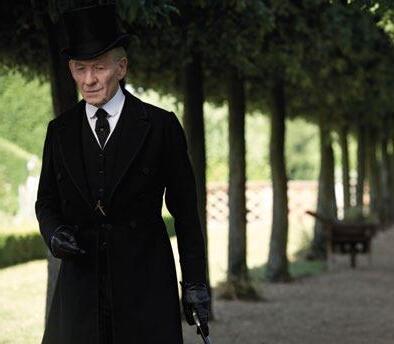
Senior sleuth: Ian McKellen as Sherlock Holmes
■ drama: mr holmes There’s never been any shortage of Sherlock Holmes adaptations, with 75 actors donning the famous deerstalker at the last count. This time it’s the turn of Ian McKellen, playing a long-retired Holmes coming to terms with the deterioration of his mind and remembering, in flashback, the events of a past case. Those used to the visual pyrotechnics of the Benedict Cumberbatch adaptations may be surprised (or even alienated) by the deliberate pace of this effort, which was adapted from A Slight Trick of the Mind by Mitch Cullin. But the gradually unfolding plot and the variety of performances (including Laura Linney, Roger Allam and debutant Milo Parker) is well worth the price of admission.
■ action/adventure: jurassic world It’s 22 years since Jurassic Park made its dino-shaped mark on the world, accompanied by John Williams’ much-loved score. Several sequels and a lot of technological advancement later, we revisit Isla Nublar, where the scientists have created a whole new breed of dinosaur that’s much bigger and more unpredictable than any before it. What could possibly go wrong?

■ documentary: electric boogaloo
Subtitled “The Wild, Untold Story of Cannon Films”, this follows the fortunes of Menahem Golan and Yoram Globus, two maverick Israelis who shook up the movie industry and launched the careers of Jean-Claude Van Damme and Chuck Norris in the process. Although it makes no claims for the quality of Cannon’s output—which was mostly awful—this hilarious documentary is one of the funniest you’ll see all year.

entertainment 06•2015 | 17 © entertainment one / © universal pictures

■ comedy: spy Armed with a host of British stars, Melissa McCarthy (Bridesmaids) plays a CIA analyst who lives in the shadow of her showy spy partner (Jude Law). When his mission is compromised, McCarthy’s unassuming desk-worker must step up to become a secret agent and head out into the field. Aided by her M-style helper—played by Miranda Hart—she shakes off her office shackles to defeat a frosty villain.
■ animation: minions Even if you’ve never watched 2010’s animated hit Despicable Me, there’s been no escaping these cute little yellow fellows—and now they have their own movie. Minions Stuart, Kevin and Bob are in pursuit of a new evil overlord to serve, and when they meet the world’s first female supervillain (Sandra Bullock), they’re recruited in a bid to take over the world.

DVD of the month
■ american sniper
Critically acclaimed and controversial war
biopic from director Clint Eastwood.*
On Your Radar Bridget Yates, retired teacher
Watching: er (online) With Poldark and Masterchef over, I’m wading my way back through this hospital drama.
Reading: slipstream by elizabeth Jane Howard This autobiography of the great novelist is the sort of book you want to go on forever.


Online: candy crush I was recently introduced to this game, as well as Pearl’s Peril, by a sadistic grandchild—and it’s addictive!
listening: songs of the auvergne by Kir te Kanawa I’m rediscovering this album and continuing my love of Queen…
Fancy appearing in this section? Send your current cultural favourites, along with short descriptions, to readersletters@readersdigest.co.uk
| 06•2015 18 entertainment
© t wentieth c
©
entury Fox /
universal pictures
Melissa McCarthy gets out of the office in Spy
* TO BUY DVDS FEATURED HERE, GO TO sHoP.readersdigest.co.uK
Music
by mandi goodier Album of the Month
algiers by algiers
The first dark synthesised note of the opening song lets you know that this won’t be an easy ride. Raw, gospel-style vocals rub up against stark, industrial melody, making for a debut album that’s minimal and loaded with intensity.
Algiers constantly refers to social and musical history. The lyrics for “Blood”, for instance, nod to Robert Johnson’s 1937 song “Love in Vain”, but this already painful blues reference is given a twist by replacing the word “love” with “blood”. As with other songs here, it delivers the kind of urgency synonymous with protest—this, after all, is a political album of social unrest brought right up to the present day. Haunting, soulful and incredibly beautiful, this is a record that grabs hold of you and doesn’t let go.

Key tracks: “Blood”, “Black Eunuch”, “Irony Utility Pretext”
Like this? You may also like: TV on the Radio, The Temptations, New Order
overlooked record from the Past “¡demolicion!” by los saicos
Do you think punk originated with the Sex Pistols? Or Iggy Pop? Wrong. It really started in 1964 with Peruvian band Los Saicos…arguably.

It’s almost shocking that something so vocally aggressive was recorded in the Sixties, but this early example of catchy teen rebellion was far from being outsider music—Los Saicos even had their own TV show in Peru. However, their popularity had begun to wane by 1966, so they disbanded to pursue conventional lives, unaware that their single “¡Demolicion!” would become a protest song for a whole new generation decades later.
On Our Radar arran Folk Festival, June 5–7, Cèilidhs and concerts on the beautiful Isle.
udderbelly Festival, until July 19, Live acts under a giant upside-down cow on London’s Southbank.
london-to-brighton bike ride, June 21, The 40th all-ability 54-mile charity cycle.
r eader’s d igest 06•2015 | 19
liSTEn TO THESE AlBUmS AT readersdigest.co.uK/listen
Melvyn Bragg, 75, is one of britain’s most celebrated tv and radio broadcasters. he’s best known for The South Bank Show, which begins a new series this month
Melvyn Bragg
“I Remember”
…going from house to house on the back of my mum’s bike. My mother Ethel used to clean some of the wealthier homes in our town—Wigton in Cumbria —and she’d take me with her. Every house was like a new playground. I also recall crawling around our kitchen. There was a chest with a picture of a ship on it, and I would trace my finger around its outline. But I’m not sure if I know what my earliest memory is. Memories are such treacherous things, aren’t they?

like mine, was fighting in the war, so your mother could work. But my school was staffed by really nice women, it had only been built a few years before and it was a good place. It was in lovely fields at the edge of town. There were hedges you could build dens in and a football pitch!
…a happy time at primary school. I was only four when I started. You went early if your father,
…enjoying living above a pub. When my father Stanley came home from the war, he worked shifts in a factory at first. Then, when I was seven or eight, he got a pub…well, more of a beer house. I thought it was a great world to be brought up in. I got to see a lot of different people, which may

| 06•2015
20 entertainment
photo courtesy of melvyn bragg / © Kathy deWitt/ a lamy
Melvyn with his mother


have made me more gregarious, but as an only child I also had the flat upstairs to myself a lot of the time, so I could get on with my own life: homework, reading, that sort of thing.
…a slow start to academia. I quite enjoyed grammar school for the first two or three years. But not a lot because I was mad on football, even though I was very bad at it, and the school played rugby. And I wasn’t all that interested in work. I dodged homework or copied it off a girl—most of us boys did.
Then, when I was 14, two brilliant new teachers arrived. Mr James, the history teacher, had flown Spitfires in the war and been to Oxford. The headteacher Mr Stowe, meanwhile, had been a major in the intelligence services—and got a first at Oxford. He taught religious instruction, but really he taught you how to argue. These two men transformed the school and inspired me to take my studies seriously.

…getting into oxford was a big surprise. I hadn’t even expected to stay at school after 15. I discovered many years later that Mr James had gone to see my father three or four times to persuade him that I should stay on and do A levels. No one else in my family had, and my father was worried about whether I’d manage. But
I remember 22
| 06•2015
© photo courtesy of melvyn bragg
Melvyn at grammar school
The sleeve photo from Melvyn’s first novel

Mucking in with the Scouts
Mr James convinced him otherwise, and away we went.
Wadham College was a genial place. Although there were a few grammarschool boys, the vast majority were from public schools, but the fact I was from a different background never seemed to be an issue.
…writing about what i knew. I started producing novels and short stories when I was 19, and many of them were about Cumbria [Melvyn has since written several best-sellers set in the area, including 1987’s The Maid of Buttermere and 1990’s A Time to Dance ]. The landscape and people had a big effect on me, and the human condition is the same everywhere, so I
could write about Cumbria and feel like I was on solid ground. Writing a novel seemed a rather audacious and dangerous enterprise, so I needed all the help I could get.
…joining bbc radio and never wanting to leave. I was awarded something called a general traineeship. The BBC only gave three a year —I was very lucky to get one and not entirely sure why I did. I suppose I’d made a film at Oxford, acted and written for the university magazine, and the BBC were looking for a grammarschool all-rounder.
It was wonderful training. I started in the World Service, where the people were so clever and good. Then I
Reade R ’s d igest 23 06•2015 |

worked in north-east local radio, then the Home Service—which is now Radio 4. I had a ball. I was PA to the great Irish poet Louis MacNeice, who wrote plays for the BBC, and worked with several great producers.
…television came calling. I didn’t really want to go on TV because I didn’t know
much about it. But I loved arts programmes and the one series I was interested in was Huw Wheldon’s magazine show Monitor . When I was asked to join the team, it was a huge career break.
I was surrounded by a very bright and helpful gang of people, such as [subsequent film directors] David Jones and Ken Russell. In 1965, I wrote my first TV screenplay for Monitor ; Debussy, which Ken directed. The BBC was a great place to be as a young person from my sort of background at that time. We didn’t really want to try for the Foreign Office because you’d become a Foreign Office man. But at the BBC, there were no such rigid patterns. You could really make your mark. And people such as Huw Weldon, who’d fought in the war and Hosting Read All About It in 1973

I remember 24 | 06•2015
Talking to Laurence Olivier on The South Bank Show
won a military cross, were tough guys who wanted to help and look after the younger generation.
…irritating the literary establishment. In 1973, I launched, edited and presented a books review show on BBC1 called Read All About It. I’d done similar programmes before, but you just got someone to sit there talking about a hardback, as if reading something they’d done for a Sunday newspaper. Dead in the water. So I took a risk and instead made what looked like a panel game, with people such as Clive James, Jonathan Miller, Margaret Drabble and Gore Vidal talking about novels. It was, I think, the most watched books programme there’s ever been. But my literary reputation, which had been going up and up with the publication of several novels, suddenly plunged. The literati were very snobbish about Read All About It —particularly those who hadn’t been invited on.

…irritating the rest of the arts establishment. London Weekend Television asked me to come and do an arts programme, which was fine as long as I could present it
and edit it—the only way to have any control. I wanted it to change the way people thought about the arts in this country. Previously, it had been a pyramid, with ballet, opera and poetry near the top, theatre, then cinema further down, and comedy and music hall at the bottom. I disliked that. I thought of art as more of a rainbow, and I wanted The South Bank Show , which launched in 1978, to reflect that. So I produced films on Paul McCartney, say, with every bit as much as scrupulous attention as I did those focusing on the Berlin Philharmonic. And I did things on TV drama, which I thought was much better than anything in the West End at the time.
I was telling the arts establishment, “You can’t have your hierarchies any more; we can see through them.” What
Reade R ’s d igest 25 06•2015 |
© bbc / re X / © t rinity m irror / m irrorpi X / a lamy
Recording at the BBC in 1988
matters is inspiration and quality, and this can come in any form. The lyrics of a pop song can be better than a poem. Lots of people gave me flack for it, but not Clive James. He got the point straight away.
… the South Bank Show has brought me many pleasures. The huge four-hour-long portrait of the work and complicated personal life of Laurence Olivier was something we did that just hadn’t been done before. I liked speaking to the author Norman Mailer in America—such a good talker. Paul McCartney was able to say important things but be witty about it. And Dennis Potter was way ahead of the field in discussing drama.
…radio still being a big thing for me. I took over Radio 4’s discussion programme Start the Week from Russell Harty in 1988 and I was far more nervous than I was doing TV. I’d listened to so much radio over my life, so it loomed larger in my mind.
Since then, I’ve done other Radio 4 shows, such as In Our Time [a show exploring the history of thought, which Melyvn has presented since 1998]. We’ve taken it from 500,000 to two million listeners. I think Radio 4 shows endure in a way other TV and radio programmes don’t because they are great pieces of work and people trust them. Things such as Gardener’s Question Time or Just a Minute listeners know they aren’t going to let them down.

Melvyn exploring the Cumbrian countryside. “The landscape and people had a big effect on me”
…always following my nose. I’ve generally done a book or a TV programme for no other reason than the subject interests me. I wrote and presented The Most Dangerous Man in Tudor England for the BBC in 2013, for instance, because I was fascinated by William Tyndale [whose 16th-century translation of the Bible into English formed the basis of the King James Bible] and the effect his work had on literature, behaviour and democracy.
I remember 26
photo courtesy of melvyn bragg
| 06•2015
…taking my kids to the l akes when they were young. We’d swish up and down hills and even the odd mountain. I loved sharing my childhood with them and their sharing their childhood with me.
…a c umbrian institution to be slightly less proud off. We live near Arsenal’s ground in north London, so I took my son Tom to games for 19 years when he was young. But my main team are Carlisle United. I remember the 1940s when they had a wonderful team, but now they’re near the bottom of League 2. It can be more rewarding being a fan of a lower league team, but not when they’re about to disappear out of the league altogether.
Receiving the Bafta Fellowship in 2010.
“It was a wonderful moment”

awards and nominations I’ve had. I’ve been lucky; I can’t have any complaints. I just keep pegging away. Keeping on, keeping on.
As told to Simon Hemelryk
…the bafta academy fellowship award in 2010. It was a wonderful moment, as were many of the other TV, literary and screenwriting
melvyn will be presenting the new series of The South Bank Show, starting this month on sky arts
i hate to admit it...
users of reddit.com reveal the facts they didn’t learn until embarrassingly late in life:
“It’s ‘for all intents and purposes’, not ‘for all intensive purposes’ ” —learned at the age of 30.”
“i thought cats were a breed of dog until i was about 15.”
“Until I was 28, I thought the seven seas were the seven Cs— meaning the seven continents.”
“i thought toiletries was ‘toilet treats’ until i was 23.”
27 r eader’s d igest © bafta / re X
06•2015 |
FOR MORE, GO TO readersdigest.Co.UK/entertainment
Outsmart a Silent Killer
reduce your risk of chronic kidney disease, a symptomless stalker that’s linked to heart disease, diabetes and premature death
By Lisa Fie L ds
28
Photo: © Adri A nn A Willi A ms/GettY
H ea LTH

n 2003, life was good for Hans Tenniglo. The native of Westzaan, Holland, was a manager for Hewlett-Packard, travelling regularly to Sweden on business. He spent his free time with his wife and children, and on weekends he ran 12 miles to stay in shape. But everything changed when Tenniglo fell ill on one Swedish business trip.
“I felt miserable, like when you get the flu—all your energy extracted from your body,” says Tenniglo, 64, who volunteers for the Netherlands Kidney Patients Association. “But it turned out not to be the flu.”
A doctor realised that Tenniglo’s sudden illness was brought on by the gradual, silent decline of his kidneys, combined with high blood pressure (hypertension). A nephrologist found that Tenniglo’s kidneys were working at only 40 per cent capacity.
“At the nephrologist, I thought, What the hell am I doing here? ” he says. “That was the toughest period. You need time to accept that there is kidney disease when you don’t feel it.”
Tenniglo began taking medication to control hypertension and maintain kidney function. Along with an exercise plan and a low-salt diet that he never wavers from, Tenniglo has avoided dialysis and transplantation for 12 years.
“A lot of people on holiday forget to be a kidney patient and cheat on their
diets,” says Tenniglo, now retired and a grandfather. “I don’t do that to my kidneys, because my kidneys don’t know that I’m on holiday. I want to cherish them so they are nice to me.”
Equal-opportunity disE asE
Kidney disease doesn’t discriminate; it affects men and women of all ages and ethnicities. The condition strikes silently, giving its victims the impression that they’re healthy while their kidneys become irreparably damaged. Like Tenniglo, most people don’t know that they’re affected until they’ve lost considerable kidney function.
Some people are diagnosed by chance. When Andrew Gallagher, 29, of Dundalk, Ireland, tried joining a gym five years ago, he needed a physical exam. Tests showed that he had hypertension, and further evaluation uncovered silent kidney disease.
“I didn’t know you could have kidney problems with high blood pressure,” he says. “I was fit enough to run and play sports.”
Fortunately, you can take steps to help lower your risk of developing kidney disease, and simple tests can identify the condition at any stage.
“It’s never too early to start treating chronic kidney disease,” says Dr David Wheeler, co-chair of Brusselsbased Kidney Disease: Improving Global Outcomes. “The earlier you treat, the more kidney function you’ve got to protect.”
| 06•2015 30 outsm A rt A silent K iller
a stE althy stalkEr
Forty million Europeans have kidney disease. Many don’t realise it, because most doctors don’t assess kidney health at routine office visits.
“Around eight to ten per cent of the population has some form of kidney disease, going from very mild to very
“For the majority oF these patients, when their kidney Function goes down, their cardiovascular events go up exponentially”
dR NoRBeRT LameiRe, European Kidney Health Alliance
severe,” says Dr Norbert Lameire, chair of the Brussels-based European Kidney Health Alliance. One study found that 18 per cent of Swiss primary-care patients may have kidney disease, and 90 per cent don’t know it.
The two most common causes of the disease—hypertension and diabetes, which are associated with obesity— have become more widespread. In ten years, twice as many Europeans could have kidney disease, according to some estimates.
“Because hypertension is going up and diabetes is going up, and we get much fatter and don’t do as much
sports, the chance that we get kidney disease can go up,” says Lameire, professor of medicine at University Hospital in Ghent, Belgium.
Over the past 15 years, the number of Europeans on dialysis or who have received transplants has doubled, but remains low. Just one in 1,000 kidney patients need dialysis or transplantation, mainly because they tend to die of complications first.
“Research shows that 90 per cent don’t die directly from kidney disease; they die from cardiovascular events, such as heart attack or stroke,” Lameire says. “For the majority of these patients, when their kidney function goes down, their cardiovascular events go up exponentially. End-stage kidney disease is the tip of the iceberg.”
Experts are trying to educate the public, since most people don’t consider their kidneys.
Kidneys filter waste and excess fluid out of the bloodstream, turning it into urine. Several conditions, including infections and genetic conditions, can cause kidney disease, which damages both kidneys. When the kidneys don’t function properly, waste and protein build up in the bloodstream, leading to hypertension and other problems that further damage the kidneys.
idEntifying thE problEm
Learning that you have kidney disease may be a blessing in disguise: you may slow its progression.
“There’s some data to suggest that
06•2015 | 31 Reade R ’s d iges T
if you intervene early, you reduce the need for dialysis,” says Wheeler, professor of medicine at University College London’s Centre for Nephrology.
Experts recommend against screening everyone for kidney disease. Rather, they advise annual testing for older people who are at increased risk: people with diabetes, hypertension or a family history of kidney disease.
“Targeted screening of high-risk groups makes sense,” Wheeler says. “Kidney disease, diabetes and heart disease are intertwined. In diabetes, high blood-sugar levels damage the kidneys, the heart and arteries. High blood pressure damages both the heart and kidneys.”
Tests at the doctor’s office can diagnose kidney disease. One looks for excess protein in the urine (proteinuria). Another checks the blood to see how well the kidneys filter waste.
Doctors consider age when looking at test results. After 50, the kidneys gradually become less efficient. Especially after 60, a moderate loss of function can be normal, as long as there are no other signs of kidney disease. Doctors should check for excess protein in the urine and exclude any link to hypertension, and a check again a year later may be all that’s needed.
“A decrease in renal function does not, by itself, mean a disease,” says Dr Antonio Dal Canton, professor of nephrology at Italy’s University of Pavia. “Aging causes a loss of renal function that cannot be considered a disease
unless it’s associated with signs of active renal damage, mainly proteinuria or a fast rate of loss.”
Because kidney disease is silent until the final stage, some people need dialysis upon diagnosis.
“A third of patients show up for dialysis without ever having a diagnosis made beforehand,” Wheeler says. “Two thirds have had tests showing progression of kidney damage and have understood that they may need dialysis at some point.”
Patients with less than 15 per cent kidney function may need dialysis. Many patients are placed on transplant waiting lists when they begin dialysis. For healthy candidates, it’s a temporary measure until an organ becomes available. Those who don’t qualify due to advanced age or health complications receive dialysis indefinitely.
“If we had enough kidneys, there would be very few people under 60 on dialysis, I suspect,” Wheeler says.
i n 1996, Robe R t d huyvette R s of Ghent sought medical attention because of unexplained abdominal swelling. The cause? Fluid retention due to late-stage kidney disease. Dhuyvetters immediately began dialysis. A year later, he received a transplant, which kept him healthy for 16 years.
By 2013, Dhuyvetters needed dialysis again, due to a decline in kidney function after heart-valve surgery. Now, Dhuyvetters performs dialysis at home.
“It’s a big advantage to do it at home,
| 06•2015 32 outsm A rt A silent K iller
because you’re not condemned to the hours that the clinic is prescribing,” says Dhuyvetters, now 71. “I have my laptop, so I can work from home. With dialysis, I have my energy back.”
trE atmEnt choicEs
Lifestyle changes and medication may slow kidney disease in early-stage patients, while end-stage patients may receive dialysis or transplantation.
Tenniglo of Holland has maintained kidney function by taking ACE inhibitors, a class of blood-pressure-lowering medication that slow down or prevent further kidney damage. ARBs have the same effect.
Dhuyvetters has experienced homeand centre-based dialysis. Which type you receive depends upon your preference and local resources.
Judit Berente of Jászkisér, Hungary, was diagnosed with kidney disease when she was 13 and avoided dialysis and transplantation for 20 years. By 33, with a new kidney, Berente felt healthy enough to participate in sports. She has swum competitively and participated in eight World Transplant Games since her transplant 19 years ago.
“I see ladies my age and they are fat, sitting in front of the TV eating treats,” says Berente, now 51. “I was fighting for 20 years to get my health back, to get the chance for a normal life. I think I’m healthier than people in my age group because I learned at a very young age that nothing means more than your health.”
Soon, new treatments may ease kidney patients’ lives.
Drugs that inhibit sodium absorption may help patients keep from further damaging their kidneys.
“People who would benefit are doing their best to follow what the doctor ordered but take more sodium than they should,” says Dr Raymond Townsend, author of 100 Q&As About Kidney Disease and Hypertension. “The thinking is: if you can’t get them to eat less salt, maybe you can block some of it.”
“i think i’m healthier than people in my age group because i learned at a very young age that nothing means more than your health”
JudiT BeReNTe Diagnosed at 13
European researchers are developing a wearable artificial kidney, which could replace the need to connect to stationary dialysis machines. It’s being tested on animals; clinical trials could begin in 2017.
“It provides treatment that outperforms traditional dialysis,” says technical manager Frank Simonis. “It provides a better removal of toxins because of the prolonged dialysis times: 150 hours per week continuously instead of three to four hours in a centre.”
06•2015 | 33
Reade R ’s d iges T
staying hE althy
You may avoid kidney disease by controlling high blood pressure and diabetes, eating a healthy diet, exercising and seeing your doctor. Other tips: s hunning salt. Kidney patients should avoid adding salt to food, but it’s excellent advice for healthy people too. Excess salt raises blood pressure and makes kidneys work harder.
Most salt that you consume is in prepackaged foods. Some countries make manufacturers reduce the amount of salt added to products. The UK instituted a salt-reduction programme in 2003 that resulted in the British population consuming 15 per cent less salt by 2011. Adults’ average blood pressure fell, and stroke and heart disease deaths dropped by 42 per cent and 40 per cent. The programme likely preserves kidney health too.
“A reduction in salt lowers blood pressure and would reduce chronic kidney disease risk,” says study author Feng He. “Increasing evidence suggests that a reduction in salt intake may have a direct beneficial effect on the kidneys, independent of its effect on blood pressure.”
giving up smoking. “Smoking accelerates kidney disease and damages arteries,” Wheeler says. “Kidney function is likely to deteriorate more slowly if you don’t smoke.”
l osing weight. Extra weight makes kidneys work harder. “It’s like working a 12-hour day, when you’re used to working eight hours,” Townsend
giFT oF LiFe
Each EuropEan country has its own rules for organ donation. some, like the uK, have opt-in programmes that require people to sign up. others have presumedconsent programmes: anyone who doesn’t opt out may have his organs donated upon death. As of 2010, 24 countries in the european region had some form of presumedconsent system.
Kidneys are also transplanted from living donors. in 2012, about 6,500 kidneys were provided by living donors and roughly 16,000 came from deceased donors, for a total of more than 22,500 europeans who received kidney transplants in that year.
to become an organ donor in a country with an opt-in system, actively sign up to the organ-donor register. You can do this when applying for an id card, driving licence, a european health insurance Card or when joining a doctor’s surgery. tell your family your wishes, because even if your name is on the register, after death the person closest to you will be asked to confirm that you hadn’t changed your mind.
06•2015 | 35
Reade R ’s d iges T
Plan ahead For your Holiday Health
STaying Home
It’s getting to that time of year – the summer months are upon us and you might be planning your break away in the country. Most of us take it for granted that we don’t have to worry much when we’re staying in Britain, but it isn’t true.
Your health should always be your number one concern and, whether you’re home or away, you should do your best to make sure that you have everything you need. Few things ruin a holiday like traipsing around the local towns looking for a pharmacy that can provide the asthma inhaler you need, so plan ahead. Failure to do so could lead to not only a few wasted days, but also to unwanted and avoidable health risks.

Travel HealTH
it is advisable to research the area to which you are travelling to find out whether you need to make any medical preparations for your trip
dr Hilary JoneS OnlineClinic Medical Advisor
Perhaps more so than when you’re staying in a country that you’re used to, travelling abroad requires forward planning. It’s bad enough having to trudge around looking for medication when you speak the language – it’s almost torture when you’re trying to get the help you need while speaking in a foreign tongue. If you have a chronic condition like asthma that you know will need treating while you’re away, then be prepared. But you also need to be equipped to handle whatever other conditions the foreign country is offering you.
adverTiSemenT FeaTUre

If you’re visiting another country then it’s very important that you know what health problems you might be dealing with, and it’s vital that you protect yourself. Certain conditions can be a real risk and if you’re visiting somewhere exotic, then you might encounter illnesses like malaria, which you’ll need to defend yourself against in advance.
Be PrePared
It’s important not to underestimate the need for planning, and, even if your health isn’t affected while travelling, it’s always better to have the peace of mind that comes with being ready. So whether
it’s asthma in the UK or malaria in South America, be sure to research, plan and prepare for your trip.
Most importantly of all, though, make you sure you enjoy yourself! It’s not something you can find in the pharmacy or medicine cabinet, but a little fun and relaxation will go a long way towards improving your health.
Since being founded in 2002, Online Clinic has gone on to successfully treat over a quarter of a million patients. Visit readersdigest.onlineclinic.co.uk or call 020 3322 2225 for more information or if you’re looking for professional medical care.
Battling Those Tooth Taboos
By sus A nn AH H i C k L ing

Susannah is twice winner of the Guild of Health Writers
Best Consumer Magazine
Health Feature
Brush up on some em Barrassing but common dental concerns and find out how to keep your smile bright.
Receding gums
CAusE There are several: teeth grinding, brushing too hard and chronic gum disease. Chronic gum disease, caused by a build-up of plaque, leads to loss of the bone that supports the teeth. The overlying gums then recede.
CurE Ease up on aggressive brushing by swapping your hard brush for a soft one and changing the way you clean. Rather than scrubbing back and forth, opt for a shorter up-and-down motion. If you have gum disease, make sure you have your teeth cleaned regularly at the dentist’s. And keep flossing...
CAuTion Left untreated, gum disease can cause your teeth to become mobile. They could then either fall out or need to be removed. In other words, say “ah” not “aargh”!

Gingivitis
CAusE Spitting blood when you brush is a sign of gingivitis, inflamed gum tissue caused by a build-up of plaque.
CurE The best place to start is with your dentist or dental hygienist, who will scale and clean your teeth to remove tartar (plaque that has hardened). You’ll need to brush and floss regularly to keep gingivitis away.
CAuTion If you do nothing, you may develop chronic gum disease.
| 06•2015 40 HEALTH
© shutterstock/ e vgeny k arandaev / © dc Photo/ a lamy / © k onstantin l abunskiy/ a lamy

Bad breath
CAusE Garlic, onion, spices—they can all cause halitosis. As you digest them, they enter your bloodstream and lungs. But, let’s face it, mouth odour can also stem from poor oral hygiene. Plagued by “morning breath”? This is caused by a decrease in saliva flow as you sleep. Bacteria from food particles proliferate and cause whiffy breath.
CurE Brush your tongue as well as your teeth. This helps because some people have fissures on their tongue where food and debris can collect and give off an unpleasant odour.
CAuTion If your mouth is as clean as a whistle and your bad breath persists, it’s time to see your doctor. Some medications, diseases and metabolic disorders can lead to halitosis.
diabetes screening at the dentist
A recent US study found that oral blood taken at the dentist’s surgery and tested for diabetes gave highly accurate results. Researchers collected blood from the mouths and fingers of 408 people treated at dental clinics in New York. All were at risk of diabetes. There was a 99% correlation between the two different types of sample. Given that people tend to go to their dentist more often than their doctor, could this be the future of diabetes screening?

06•2015 | 41






3 MyTHs ABouT vAriCosE vEins
Myth 1: crossing your legs causes varicose veins.
Fact: there’s absolutely no proof of this. and, according to the latest research, standing for long periods doesn’t cause them either—it just makes veins worse if you already have a problem.
Myth 2: you don’t need treatment until they get really bad.
Fact: you need to talk to your doctor now. if varicose veins are left untreated, the pressure in the vein can increase, causing swollen ankles, phlebitis (inflammation and blood clot), skin problems and even venous ulcers.
Myth 3: Women get varicose veins more than men.
Fact: actually, they don’t. they’re just more likely to do something about them—probably because unsightly veins are more often on show, especially at this time of year when the weather’s warmer.
Cartilage Boosters

■ Pomegranate When researchers in the US put pomegranate extract on samples of cartilage damaged by osteoarthritis, it lowered levels of an inflammatory chemical linked with overproduction of a certain enzyme. This enzyme is essential for cartilage replacement, but when too much is produced cartilage wears down. Aim for: 2–3 tablespoons of undiluted juice daily.
■ Colourful produce It’s high in antioxidants and fights free radicals. People with arthritis have more than their fair share of free radicals, so need to max out on antioxidants, especially beta-carotene and vitamin C. Aim for: 5–6 servings of vegetables and 3–4 of fruit daily.

■ Fatty fish Omega-3 fatty acids boost production of “resolvins”, a class of antiinflammatory fats. They inhibit inflammatory cells, a good thing for people with arthritis. Aim for: 2-3 servings a week of fatty fish such as herring, salmon and mackerel.

Reade R ’s d igest 06•2015 | 43 © shutterstock/ t ibanna79 / © shutterstock/ s vitlana-ua / © shutterstock/ b inh t hanh b ui / © shutterstock/ a frica s tudio









































































Cartilage and bone health are important for long term wellbeing and an active life. If you are looking for a daily supplement to give you extra support from within, Jointace® has been specially formulated by Vitabiotics’ experts to provide premium nutritional care. With a unique combination of nutrients, and vitamin C which contributes to normal collagen formation for the normal function of bone and cartilage.






















nutritional support for an active life

































ADJONSPRINGP_RD_17-03-15E
GEL or PATCH for direct application. Ideal alongside Jointace® Tabs or Caps
also
Voted 2013 Favourite Glucosamine Product by Boots Customers Fizz Original with Omega-3 Collagen Max Sport
, Superdrug, supermarkets, Lloydspharmacy, chemists, Holland & Barrett, GNC, health stores & www.jointace.com
GB ScanTrack Total Coverage 52 w/e 31 Jan 2015. QUEEN’S AWARD INNOVATION IN VITAMIN RESEARCH
From
*Nielsen
Men’s Health: Wean Yourself Off The Screen
Women watch more TV, but men are more likely to be hopelessly addicted to computer games. To cut your risk of diabetes, obesity and other health nasties, try these tricks to turn off:
■ set a rule that you can’t surf the net or switch on a TV if the sun is shining. Instead, go for a walk, ride a bike or get some other kind of physical activity for at least an hour before you switch on.
■ read a book. Get through 30 pages before you can turn on a computer, tablet or TV. If you pick the right tome, you’ll create a whole new addiction.
■ switch off during meals. Make sure you include your smartphone and tablet in that, and make eating at the games console a no-no at any time.

■ Donate extra TVs to charity. Allow yourself one telly in a room dedicated to viewing or reading. That will make it a lot harder to veg out in front of it.
■ play games. That’s real games, not the computer variety. Relearn the fun of Scrabble, backgammon or chess, or get out the playing cards and have a snap or gin rummy battle.
P that’s P for fresh Produce. have you eaten your five a day?
E have you had enough exercise? in particular, check you’ve done 30 minutes’ brisk walking.
r that stands for relaxation. note whether you got at least 15 minutes of laughter and fun time for yourself.
F did you eat enough fibre? check that your meals contained plenty of beans, grains and other high-fibre foods. think wholemeal bread and brown rice.
Reade R ’s d igest 06•2015 | 45
THis MonTH’s HEALTH CHECk: HAvE A PErF-ECT dAy
© l isa f y oung/ a lamy
Maintaining A Decent Distance
By max pem B erton

Max is a hospital doctor and author.
He’s also the resident doctor on ITV’s this Morning
“drop your trousers then, Max,” he said, like an old friend. Except he wasn’t an old friend, and I wasn’t sure even my old friends would come out with such a request. I hesitated and looked around the room. No chance of escape.
“Come on, let’s have a look.”
This was entirely self-inflicted, since it was I who’d made the appointment. Doctors make bad patients, mainly because they’re all hypochondriacs. I’m no exception—having found a little lump and convinced myself that I was going to die, I thought I should do the sensible thing and get it looked at.
it wasn’t until i was in the waiting roo M, feeling slightly uneasy about being on the other side of the sick role and with no prospect of a stethoscope to dangle in front of my modesty, that I began to panic. But it was too late to back out now. I swallowed hard and stared at the ceiling while he did what he had to and it was all over. Phew!
I’m sure that he was trying to put me at my ease, but there was something about his demeanour that just made my toes curl and me rush to pull up my trousers.
“Well, Max,” he said, “nothing wrong there.” And then as I walked out, he did it again: “See you, Max.”
| 06•2015 46 H ea Lt H








It seemed we’d become friends and I wasn’t even aware of it. Why else would he be using my first name? I don’t want to be friends with my doctor, because sometimes they have to do things that no friend would do to you. Yet, in recent years, it seems as if the trend for using first names has become de rigueur.

across a nursing-home sitting room, especially by someone young enough to be Mavis’ grandchild. I think it’s part of a wider problem, whereby no one likes to think that they should be deferential to anyone else.


I do think there are times when it’s appropriate for a doctor to use first names. Sometimes, particularly with younger patients, it’s less intimidating. There are also times when a long relationship between doctors and patients makes it strange to carry on the pretence of things being merely professional. But it’s the wholesale adoption of “assumed intimacy” that gives me the creeps.
There’s something disrespectful about bawling “Mavis, it’s teatime!”






The distance afforded by surnames is a good thing. It sends a message that the relationship is a professional one, and calls on pervasive social etiquette to help enforce people’s roles and responsibilities. I actually like calling patients by their surnames. To my mind, it gives an immediate message of respect and also helps keep a suitable emotional distance, both for me and them.




Maybe we’ve mistaken being caring with being intimate. But when you’ve got your trousers round your ankles, you don’t want your doctor to be any more intimate than necessary.
06•2015 | 47
© Sally Elford/ a lamy
You Should Stay Awake If You’ve Had A Concussion

WHere did tHe mytH come from?
I remember my mum screaming at me to keep me awake after I fell down an open manhole and cracked my head when I was eight.
“If he goes to sleep he might die,” she wailed at my father.
He looked unconvinced, and so he should have—there’s no truth in it. After a very serious head injury, which has caused a slow bleed in the brain, there’s sometimes a delay in the symptoms—called the “lucid interval”—whereby they appear fine
but then suddenly deteriorate and slip into a coma. So the myth has arisen that if you keep them awake, they won’t go into a coma.
WHat’s tHe trutH?
Your brain is soft and delicate, and is encased in a tough shell: the skull. But when you receive a blow, the brain can get squished against the side of the skull. This can cause swelling and bruising, and the brain can stop functioning properly for a while. This is concussion. Most are mild and don’t require any treatment. Bleeding occurs in a tiny number, and keeping someone awake won’t change this.
so, tHere’s notHing to Worry aBout?
The vast majority of concussions resolve quickly and aren’t a cause for concern. But if someone who’s had a serious head injury starts to complain of worsening headaches, or they become confused, have difficulty talking, are sick or have seizures, they need immediate medical attention.
Illu S trat I on By da VI d H um PH r IES | 06•2015 48 H ea Lt H
medicaL mytHs—Busted! FOR MORE, GO TO readersdigest.co.uK/HeaLtH








































miV And miKe
Live in different countries most of the year
Miv Watts and Mike Gurney have been a couple for 21 years. They live together three to five months of the year in a property they share in Australia’s Byron Bay. The rest of the year, 67-year-old Mike lives in Burnham Market, Norfolk, and Miv is based in the south of France.
“I stay in Norfolk when I’m working in the UK and Mike comes over to France for a few days every six weeks,” interior designer Miv explains. “I absolutely love it when we meet up. But if we’d been living together full-time, we’d have split up after five years.”
Remembering their first encounter back in 1975, Miv laughs, “I bought fish from this little stall on the side of the road and I thought, Who’s this man selling fish in his underpants? Then I ran into him at a dinner party some years later and it went from there.”
When they became a couple in 1994, they were both divorced with grownup children and didn’t feel the need to marry again. (Miv is the mother of film star Naomi Watts and photographer Ben Watts.) They tried living together full-time in Norfolk for two years, but it didn’t suit them.
“I couldn’t deal with the fish business. The kitchen was always full of things being peeled and Mike does a lot of smoking fish, while I’m a stylist working with beautiful fabrics. The
Miv and Mike at their home in Australia, which they share for a few months every year

i love it when we meet up. but if we’d been living together full-time, we’d have split up after five years
my WI fe next door | 06•2015 52
© m ark Luscombe-Whyte/ t he Inter I or a rch I ve


two aren’t compatible,” says Miv, 66. The pair see living apart for most of the year as a way to keep the positives of being a couple without the negatives such as routine and struggling to compromise. “Mike’s not the tidiest of individuals and I don’t like mess. I’m all about vision and I can’t work creatively unless I know everything’s in order. I’ve brought up my
kids and I don’t need to be anyone’s mummy any more!” she laughs.
“Mike’s very consistent. He’s a homebody and likes routine, but I get bored very quickly and like a bigger world. I’m on a long piece of elastic. I know he’s there and everything’s going to be all right. Of course, we talk for hours on the phone—every other night when I’m in France. I think he quite enjoys me relaying my adventures.”
They both appreciate having their own space. “I love time alone—I’m cranky otherwise. My thinking time is important to me and I don’t like to be interrupted. Mike loves being alone too. He’s a hunter-gatherer and goes shrimping at the beach whatever the weather. But I don’t want to stand up to my waist in the North Sea. I prefer sunnier climes.”
They’ve had their house in the sub-tropical hinterland behind Byron Bay for about 12 years and treasure their time together there. “Mike and I are both mad about the nature and wildlife here. Every night we go to watch the platypus family in our creek and feel thoroughly privileged.”
“We may still bicker over things like what’s in the fridge. (I had to draw the line at having eels in there—things with frozen expressions staring out at me.) But we’re living life on our own terms and it works, in our strange way.”
miv designs interiors and sources bespoke furniture and antiques. see wattswishedfor.com for details
Re A de R ’s d igest 06•2015 | 53
Anne And AARon
Live next door to each other
Anne Watson and Aaron Shepard married in 2004 and have been living happily ever after—in adjacent flats.
They were middle-aged when they met through work in 1998. Anne was a divorced architectural consultant, Aaron a children’s author. “We had a long-distance relationship for several months and then decided to live together,” says Anne, now 68.
Wanting lots of room, they rented adjacent flats with an interconnecting laundry room, which they used as one large flat. But a sense of discomfort grew between them.
“Anne’s a wonderful lady and did her best to accommodate me. But having lived alone so long, a hermit’s ways die hard!” says 64-year-old Aaron.
Anne adds, “Aaron snores and likes heavy covers and a warm bedroom, but I have insomnia and sleep best with light covers and the window open.”
While Anne has a good breakfast and grazes for the rest of the day, Aaron likes a substantial lunch and dinner. “I have to watch my weight, but Aaron loses a pound if he blinks more than usual,” she laughs. “He has food allergies; I don’t. I prefer a dishwasher; he hand-washes dishes.”
They had different ideas about their home. “My husband is happy if the place is functional and efficient, but I want my home to look like a spread from an architectural magazine,” says

Anne. “We found it frustrating negotiating every decision—where to hang a towel, where to put the rubbish bin, whether a microwave is a need or a nuisance. Although we had very few arguments, all this irritation made me feel that the flat wasn’t home.”
After six months, they admitted defeat and retreated into separate flats. But, a month later, they decided to try again—this time living separately.
“I don’t think we had any more friction than most other couples,” Aaron says. “It’s just that we weren’t willing to accept as inevitable the standard arrangement of living together.”
my WI fe next door | 06•2015 54
© photo: a aron s hepard
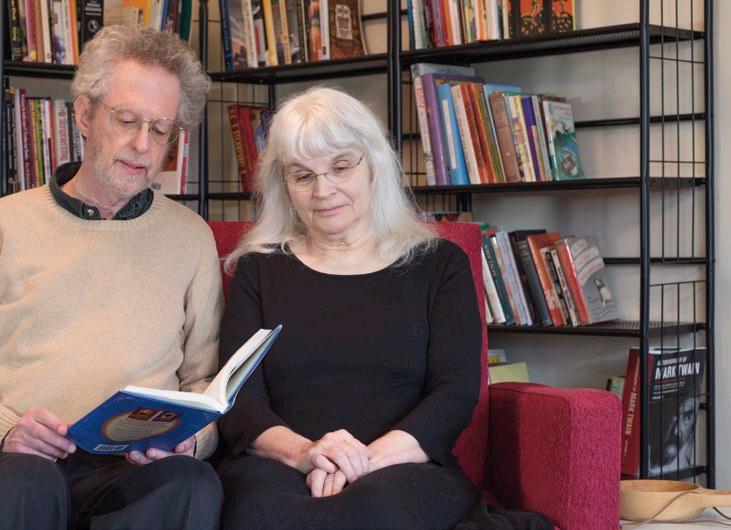
The American couple, who live in Washington State, married a few years later and now feel they have the best of both worlds. “We both need time, space and silence,” says Anne. “But we also have as much time together as any working couple—and it’s quality time, without disagreements.”
“In the evening, Aaron comes over and reads to me, often children’s books or fantasy, which we love. After that, we curl up and discuss our day. Then he goes home and I sleep.”
No longer locked into compulsory cooking, occasional shared meal times have become a treat.
“We sometimes give each other certificates saying, ‘Good for one pizza with 24 hours’ notice,’ ” she laughs. “Living apart doesn’t change our sex lives—except that petty resentments no longer complicate our feelings. If having separate flats costs us a little more, we save money in other ways. We share a car and don’t commute or have expensive holidays. Living apart is a valid choice for ordinary couples, and it’s becoming more common.”
Re A de R ’s d igest 06•2015 | 55
Living Apart Together by Anne
Watson is published as an ebook by shepard Publications at
l
£5.99
JUliette And Pete
Live apart while Pete serves his country
For Juliette and Peter Lewington, living apart for much of their marriage hasn’t been a choice. As a chief officer in the merchant navy, Pete’s career has taken him around the world and away from home for up to six months at a time.
When Juliette met Pete in 1995, she found it exciting that he’d been at sea since he was 16. And, 18 years later, she believes that being apart has benefitted their marriage.
“Our early relationship was based on letters. I wrote to Pete every other day and I’d get two or three letters a week, provided the ship was in port or had a helicopter on board! We said more about our feelings in the letters than we did face to face. They gave us a really strong foundation.
had a few days together. For us, the first flush of romance lasted four years.”
With the arrival of their son Jack, now 14, Pete took three months’ leave and then transferred to a shore-based job in London so that he’d only be away Mondays to Fridays. “During the week, it was exhausting and I felt lonely without Pete,” Juliette remembers. “It was hard when he had to miss special occasions. One year, we had Christmas in February!”
After the arrival of twins Natasha and Alexander in March 2007, family life became hectic with three children under six. Switching between being apart during the week but together at the weekends was a challenge.
pete is used to giving orders. but when he comes home, he has to fit into the routine we have here
“I was 32, with my own career in London and a good social life, so it was the best of both worlds. The anticipation of seeing Pete was exciting. Every time he came home or I flew out to meet him somewhere interesting, I’d fall in love with him again.
“I’d wear glamorous clothes and get my hair done. We had money, time and stayed in some lovely places. We were on our best behaviour because we only
“Pete is used to giving orders, and at times I’ve said, ‘I’m not a cadet on the ship!’ When Pete comes home, he has to fit into the family routine we have here. If he puts something away in the wrong place, I ask him to do things my way. We’ve learned to communicate well and talk about difficult issues as we’re not together for long periods. We might have argued more if we’d been together more.”
“There have been moments when I’ve wished Pete had a normal job and I’ve occasionally felt resentful that Pete’s off to a sunny location while I’m
| 06•2015 56 my WI fe next door

at home doing housework and homework. But it’s his job and I know that being apart can be difficult for him too. Pete feels jealous of all the time I get to spend with the children.”
These days, Pete, 51, is away from home two or three times a month for up to a week at a time.
stay in touch with emails and texts—sadly

there are no letters these days! But we all love it when he phones and look forward to him coming home.”
“A lot of relationships get mundane, but ours is still exciting. Pete’s off to Scotland tomorrow and Dubai the week after next. We’re still interested in each other and have masses to talk about. Being apart has worked.”
Question 11:
do you understand how to use the new work software?
yes no X
57 06•2015 |
“We
© photos courtesy
ju LI ette L e WI ngton
of
A n enlightening A ns W e R
Juliette, Pete and family: (from left) Natasha, Alexander and Jack
An ActUAl ResPonse to A WoRKPlAce sURVey (As seen online)
Psychologist Dr Philip Zimbardo is famous for the controversial Stanford prison experiment. He also set up The Heroic Imagination Project in San Francisco in 2010 and is the author of over 50 books
If I Ruled the World Philip Zimbardo
I’d eliminate poverty and hunger everywhere in the world. The gap between rich and poor is bigger than ever. The question is, how do we get the rich to give more to improve the lives of those without? Where poverty and hunger exist, extremism and war follows.
Education would be accessible and free for every person who wants it. You can’t force education on people, but it should be seen as lifelong pursuit. In countries where women are educated, the quality of life improves and the gross national product rises.
I’d reduce prejudice and discrimination while promoting appreciation and valuing of diversity. We’re seeing huge migrations of people, but countries aren’t handling the tensions adequately. Each nation should have a Department of Assimilation. We must teach our children to value diversity. Imagine how dull the world would be if we were all the same!



INSPIRE | 06•2015 58
I llu ST ra T e D by Jame S Sm ITH
People would challenge unjust authority. Every society emphasises the importance of kids obeying their parents, teachers, priests, etc. That’s fine if the authority is well meaning, but we should oppose those who preach that only one religion is valid and other ways of life are inferior.
I would stop slave labour and sex trafficking. The UN has recently highlighted the increase in slave labour and documented evidence to show that sex trafficking has become the most profitable business in the world. This should be prosecuted in the same way as drug trafficking.
I’d oppose the evil of inaction in failing to combat climate change. Without huge changes, it may be too late to save the environment. I just came back from French Polynesia, where the islands will vanish within five years from rising sea levels. Evidence shows the destruction is happening faster than we imagined.
Every young person would be valued as an agent of social change. They’d be ready and willing to stand up, speak out and take effective action as Everyday Heroes-in-training. I started the Heroic Imagination Project to find ways to educate young people around the globe to become heroes. Heroes are ordinary people willing to take extraordinary action to help others or to stand up for a moral cause.
Boys would feel empowered to be actively engaged in the social life of their community. Many young men are disconnected because the alternative reality they get through video games and online pornography seems more exciting. I’m sounding the alarm about this in my new book as so many young men are failing in school, failing to make relationships and failing to find happiness.
I’d have whipped cream with everything bland. I grew up really poor, so it was a special treat. When I was a student, I’d go to a soda fountain for a sundae and extra whipped cream. Eventually I confessed I didn’t like ice cream, so the waitress would just shoot whipped cream into my mouth. Obviously that was a little disgusting…
I’d make ageing a crime, punishable by staying youthful always. At my age, 82, it’s the inevitability of ageing that gets to you. I’ve had knee surgery, three hip replacements and if I walk more than a couple of streets I need my cane. But I try to stay fit—I’ve just come from my Zumba dance class— and to make time for all the important things in life; friends, family, nature and romance.
As told to Caroline Hutton
Dr Philip Zimbardo’s new book, Man (Dis)connected—How Technology has Sabotaged What it Means to be Male, is published by Rider and is out now.
06•2015 | 59
Whether you’re looking for antiques, food, collectors’ items or just random junk, our rich heritage has produced some of the finest markets in the world
Best of British
Markets
By lau R a d E a N -o S good
INSPIRE
60

Edinburgh Farmers’ Market
EdINBuRgh
Traders have long sold their goods in the shadow of the city’s spectacular castle, which dates back to 1130—and it’s a tradition that shows no sign of abating. Edinburgh Farmers’ Market
takes place on Castle Terrace every Saturday and attracts a huge crowd with its locally sourced goods. The market is now in its 15th year and champions the very best in Scottish produce, from knitwear to organic water buffalo and lobster.
best of british | 06•2015 62
© previous image: shutterstock/ tashaNatasha / © p aul g apper/a lamy
Edinburgh Castle provides a historical backdrop to the local market

The surrounding area is also brimming with history—nearby Grassmarket was a thriving market place in medieval times, as well as being the site of public executions.
■ Visit edinburghfarmersmarket. co.uk for details

Billingsgate Fish Market loNdoN
This hub in the heart of the East End is the biggest inland market of its kind in Britain. And with a history dating back to the 16th century, it’s an essential cog in the industry’s wheel.
Billingsgate is served by almost every UK port, with fish transported through the night to arrive for trading, which starts at 4am. As well as being famed for shifting 25,000 tons of fish each year, the traders have also attracted their fair share of attention: the term “Billingsgate” became a byword for crude language in the 16th century, applied to both traders and their wives.
It’s still quite lively today, of course, and you’ll find lots of family businesses that have continued from generation to generation—all of which can be seen on a pre-arranged guided tour.
■ Visit billingsgatefishmarket.org for details
R E ad ER ’ S dI g ES t 06•2015 | 63 © joh N N orma N /a lamy
Ford Airfield Market
WESt SuSSEx
Looking for an old-style prosthetic leg, a ventriloquist’s dummy, or even a suit of armour? The chances are you’ll find what you’re after— and plenty of other random stuff— at one of the hundreds of stalls here. A market and two huge car-boot sales are held throughout the week all year round, come rain or shine.
“It can take a few hours to get around,” says Kay Urquhart, a regular visitor. “If you get there early, you’ll see everything from boxes of photos to milk pales and collectors’ items. You can even get your car washed while you’re wandering.”
The market has been running for 25 years and is a well-known treasure trove for antiques experts looking for a bargain. While you’re trawling the stalls, you might even see the BBC filming their show Put Your Money Where Your Mouth Is . ■ Visit fordairfieldmarket.co.uk for details


Last year, St George’s was voted NABMA best large indoor market
best of british | 06•2015 64
© courtesy of belfast city cou N cil

St George’s Market
BElfaSt
Follow your nose along May Street in Belfast and the smells of delicious home-made food from across the globe will land you in St George’s Market. With three different weekly markets accompanied by fresh food and live music, St George’s was once voted the best in the UK.
When Belfast became an important port in the 17th century, the range of goods grew and trading thrived. This covered market in the city centre was completed in 1896, and the historic trading place—which once encompassed a slaughterhouse—is now one of Belfast’s oldest attractions, thanks to its lively atmosphere, wide range of goods and live music performances.
Visit on Friday for the Variety Market, featuring anything from Atlantic sharks to zips. Saturday, meanwhile, covers foods, crafts and gardens, while Sunday sees the addition of antiques.
■ Visit belfastcity.gov.uk/markets for details
Aberdeen Country Fair
aBERdEEN
Running the length of Belmont Street in the heart of Aberdeen, the Country Fair is a true celebration of all things foodie. The traders that gather on the last Saturday of every month share a passion for quality produce, which is sourced locally and sold in many cases by long-standing, family-run businesses. With around 40 stalls, selling everything from haggises and game to artisan breads, the Country Fair has become one of the largest markets in Scotland since its inception in 2000, and now attracts around 30,000 visitors to its vibrant, once-monthly events.

■ Visit aberdeencountryfair.co.uk for details
R E ad ER ’ S dI g ES t 06•2015 | 65
© photo: Naa o yoo Quartey W

Kirkgate Market lEEdS
Since its inception in 1857, bustling Kirkgate Market has remained a key part of Leeds’ retail scene and a favourite of Leeds locals. With around 800 stalls indoors and out, running six days a week, the market is a mecca for bargain hunters attracted by the good prices and lively traders. Many of the stalls and shops are run by long-term residents with a passion for market trading.
“My father had it before me and my grandfather had it before that, so it’s a traditional family business,” says Leo Burke of Mr Meat’s butchers.
The large student population in the city is also wise to the great value on offer at Kirkgate, and many of the traders offer student discounts.
“A lot of young people have moved into the area,” says Leo, “and if they visit my shop, I can guarantee they’ll come back—they can’t believe the difference in price compared to supermarkets.”
■ Visit leedsmarkets.co.uk for details
Sunbury Antiques Market SuRREy
This celebrated fortnightly market is a must-visit event in the collectors’ calendar. It takes place beside Kempton race track and is run by Edward Cruttenden, whose late mother began the market in 1979.
“I’ve been involved since the beginning,” says Edward. “We attract a global customer base but maintain free admission.”

With around 700 stalls inside and out, there’s a great deal for collectors, designers and prop buyers to get excited about.
“Many continental stallholders arrive here loaded with their own regional offerings,” claims Edward. “Some of the pieces have persuaded
some British dealers to give up the cross-Channel run altogether!”
■ Visit sunburyantiques.com for details
do you have a favourite market that’s not mentioned here? tell us by emailing readersletters@readersdigest.co.uk
06•2015 | 67 R E ad ER ’ S dI g ES t © image broker / a lamy / © courtesy of su N bury a N ti Q ues market
FOR MORE, GO TO REadERSdIgESt.Co.uK/INSPIRE

Can We Survive On Mars?
68 travel & adventure
An artist's impression of what a colony on Mars might look like

If you believe the news, a human mission to Mars is no longer a sci-fi fantasy. But what problems would we need to overcome? And should we even try?
by Jo Carlowe
Next month, the Horizon Probe will make its closest approach to the dwarf planet Pluto, having completed an eye-watering nine-year, three-billion-mile voyage. Pluto is so distant that it lies in the Kuiper Belt, a region of the solar system beyond the planets. This raises the possibility that space travel might one day be boundless.
For now, though, all eyes are on Mars, a mere 180-day journey away and a possible target for a future human colony. And this isn't merely science fiction—the space race has already began.
One example is Dutch company Mars One, which plans to launch a one-way-trip with four astronauts to Mars, landing in 2027. Additional crews will join them every two years to form a colony. Sceptics largely dismiss Mars One as a stunt, but a more viable proposition is Nasa’s Orion, the first mission since Apollo designed to take humans into deep space. A return trip to Mars is planned for the 2030s.
In preparation for this, Nasa and the European Space Agency (ESA) are studying Mars with a host of spacecraft, in an attempt to solve the

mystery of how Mars lost most of its atmosphere. In 2021, Nasa’s rover will test an experimental weather station on Mars and also a device to convert carbon dioxide into oxygen.
Much has been discovered already. Two of the most exciting finds this year concern water, one of the vital ingredients for life as we know it. Using powerful infrared telescopes, Nasa scientists have confirmed that Mars once had more water than the Arctic Ocean, and some of this remains locked up in Martian polar caps. The Hubble Space Telescope, meanwhile, discovered yet more
| 06•2015 70 c A n we surv I ve on MA rs?
P rev I ous IMA ge: © Algol o nl I ne/Al AM y / © Dou KD ou K /Al AM y
Ever since the first successful Mars flyby in 1965, human missions to the planet have been proposed

water beneath the surface of Jupiter’s largest moon Ganymede—another future space destination.
How do we get to Mars?
The furthest we have sent astronauts is to the moon, about 240,000 miles away. This is small fry compared to the 35-million-mile journey to Mars. Reaching the red planet will require some serious hardware. Nasa will use its new heavy-lift rocket the Space Launch System (SLS) to propel Orion —the new generation of spacecraft— into space. The SLS is more powerful than any previous rocket, firing over
8.4 million pounds of thrust, equal to 135 Boeing 747s. The computers running the software on Orion have the ability to handle 480 million instructions per second.
There's been speculation that astronauts will be put into “hypersleep” (a therapeutic coma) during the journey to Mars and kept alive intravenously, to conserve resources. Although a favourite trope of sci-fi films, experts think this unlikely.
How will we live?
Humans will need self-sustaining water, food and oxygen to survive on
06•2015 | 71
Mars. Extracting water locked up in ice will be crucial. Nasa is developing an excavator device called RASSOR (Regolith Advanced Surface Systems Operations Robot), designed to mine water, ice and fuel from planetary soil.
Mars One also plans to send a water extractor to heat the soil until the water evaporates. The water will then be condensed and stored, the dry soil expelled and the process repeated. Mars One claims its astronauts will have 50 litres of recyclable water every day.
Food will need to be grown and harvested, but farming in space isn’t easy. You can’t plonk crops into earth and sprinkle on water, because in microgravity free soil and water will fly around and “foul the interior of the spacecraft”, warns Dr Anna-Lisa Paul, expert in molecular and cellular biology at the University of Florida.
You just can’t plonk crops into earth and sprinkle on water because free soil and water will flY around
“Plants can be grown in space, but all require the management of gasses, water and a growing substrate,” says Dr Paul, who’s been studying the use of Arabidopsis (thale or mouse-ear cress) on the International Space Station. The crop is perfect for Mars, able to grow on a 10cm petri dish and closely related to vegetables such as broccoli and radish. It matures quickly and scientists already know its complete genetic code.
Special growing systems will be

| 06•2015 72 c A n we surv I ve on MA rs?
© MA rs one IMA ges : BryA n v ers T eeg/M A rs o ne
How the habitats could be arranged, including living quarters, storage and a greenhouse to grow fresh food
A proposed living unit for the Mars One mission: the solar panels in front generate power, and two inflatable habitats (below) lie behind

required, such as VEGGIE (the Vegetable Production System project), a microwave-sized chamber in which plants receive carbon dioxide and controlled-release fertiliser, and fans stir the air (heavy gasses sink and light ones rise on Earth, but in space

this doesn’t happen). Food might also be “printed”. Nasa is working with Systems & Material Research Corporation (SMRC) to develop a 3D printer to mould protein, starch and fat into shapes and microjet in flavours and nutrients. David J Irvin, director of SMRC, predicts there will be 25 to 50 basic food items, including bread and pastries.
“We’re not trying for out-of-this world designs,” Irvin says. “The food shape will be practical to guarantee even cooking and efficient processing times. So pizza will look like pizza and biscuits like biscuits. We’re not planning for Michelin-star food—just healthy and nutritious meals.”
At Mars One, meanwhile, it’s been suggested that the colonists might recycle human waste to provide nutrients for their crops, and their diet might include insects and algae.
r eader’s d igest 06•2015 | 73
Nasa's Orion spacecraft safely splashing down in the Pacific Ocean after its test flight last December

Plants might be used to produce oxygen as well. Dr Paul claims a bank of photosynthetic organisms (such as green algae) could be used for this task. Nasa also plans to convert the carbon dioxide that dominates the thin Martian air into oxygen using MOXIE—a machine able to produce threequarters of an ounce of oxygen an hour. If successful, a bigger device will launch two years before astronauts land on Mars, to produce oxygen for human respiration and for rocket fuel.
pHysiCal and psyCHologiCal iMpaCts
Space travel comes with a health warning. Using the International Space Station (ISS) as a test bed, element scientist Professor Peter Norsk of Nasa’s Human Research programme has been investigating some of the physical challenges that astronauts will face.
Our bodies work differently in space—even the way our blood flows. On Earth, gravity drags bodily fluids downwards, but in space this doesn’t happen, so the heart has to work
| 06•2015 74 c A n we surv I ve on MA rs?
© u s nA vy / © n A s A/B I ll sTAFF or D
on earth, gravitY drags bodilY fluids downwards, but in space the heart has to work much harder
In March, American astronaut Scott harder to pump out more blood and more fluids cumulate in the head, putting extra pressure on the eyes. Russian cosmonauts place their bodies in low-pressure boxes to draw blood into the legs and wear bracelets around their thighs and upper arms so blood accumulates in the veins of the limbs. Nasa is currently testing the effectiveness of this.
Astronauts on ISS do two hours of daily aerobic, resistance and treadmill exercises to stave off the effects of weightlessness, which causes rapid bone and muscle wastage. Professor Norsk says the same countermeasure will be used on Mars, which has roughly one-third of the gravity of Earth. The use of the osteoporosis drug bisphosphonate to prevent bonemass loss is another option, and artificial gravity is being tested using a centrifuge spinning device.
Diet will also be important, and scientists are looking at foods that protect bone health and are rich in antioxidants to boost immunity. Space plays havoc with the immune system—bloodplasma samples taken from astronauts before and after a voyage show that some
cells fail to kick in when needed, awakening latent viruses such as chicken pox, while others are overactive and cause allergy symptoms.
As well as physical challenges, the isolation, confinement and loss of privacy associated with long-duration space travel can provoke mentalhealth problems such as depression.
Engineers and technicians test the spacesuit the astronauts will wear in the Orion spacecraft
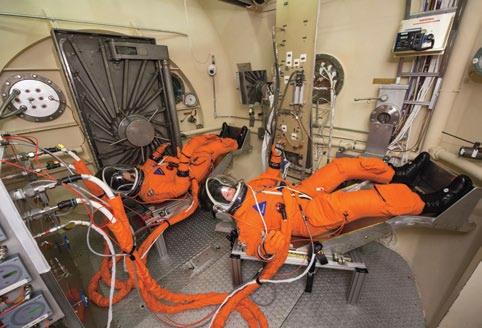
r eader’s d igest 06•2015 | 75
Kelly and Russian cosmonaut Mikhail
Kornienko will set off for a “One-Year Mission” on ISS, during which a host of psychological tests will take place to see how they cope mentally. Nasa is also trailing a Virtual Space Station, using a virtual-reality headset to send calming sounds, smells and images, and provide access to a virtual therapist and a self-administered depression-treatment programme.
teCHniCal CHallenges
The technical trials of reaching and inhabiting Mars are immense, but perhaps the greatest challenge is the threat posed by radiation. Astronauts who travel beyond low-Earth orbit are outside the protective shield of Earth’s atmosphere and magnetic field, exposing them to galactic cosmic rays that damage DNA and increase cancer risk.
environment and countermeasure efficacy” to recommend crewexposure limits for extended lunar and Mars missions.
The plan so far is to shield space vehicles and habitats to protect the humans inside. Orion has radiation sensors, and will use the mass already on board to maximise the amount of material (including equipment, supplies, launch and re-entry seats) that can be placed between the crew and the outside environment.
human spaceflight provides a broad set of benefits that, when taken together, makes a compelling case
The Mars One living quarters will be covered with 16 feet of soil, to shield the inhabitants from cosmic rays. Their scientists say this will provide the same protection as the Earth’s atmosphere.
etHiCal issues
Nasa prohibits its astronauts from increasing their probability of dying from cancer by more than three per cent, but at least one expert has estimated that exposure to radiation on Mars could cut 15 to 24 years off an astronaut’s life.
Nasa admits there’s “insufficient knowledge of the health effects of radiation, the space radiation
In June last year, the Committee on Human Spaceflight of the National Research Council, cochaired by Jonathan Lunine, professor of planetary science at Cornell University, testifed before the US Congress that humans should continue exploring space, but funding would be needed for decades if we are to reach Mars. Such a programme, however, will cost hundreds of billions. Can the expense be justified?
| 06•2015 76 c A n we surv I ve on MA rs?
© n A s A/J IM g ross MA nn

“No single rationale justifies a human spaceflight programme,” says Professor Lunine. “It’s the aggregate. Human spaceflight provides a broad set of benefits that, when taken together, makes a compelling case for such a programme.”
Experts divide these benefits into practical and aspirational. Practical benefits are economic, educational and political. Space travel stimulates the aerospace industry and entices people into careers in science and engineering. And while space exploration is collaborative between countries (unlike the space race of the 20th century, which was dominated by the Cold War and the need for spaceflight supremacy), leading the
financial and technical aspects of a space programme raises a country’s standing on the world stage.
Aspirational rationales, meanwhile, are described as “a shared human destiny and urge to explore”. And, ultimately, landing on Mars might be more aspirational than practical. While a human landing might happen in 35 to 50 years’ time, an entire self-sustaining colony could take centuries.”
“You can’t really quantify the value,” says Lunine. “But people are moved by aspirational rationales. If that wasn’t the case, everyone would study business and we’d have no philosophers or arts graduates to give colour and texture to existence.”
06•2015 | 77
Investigating the Orion's data after its successful test
After coming to terms with its troubled past, Warsaw has emerged as a vibrant, modern city

Warsaw, Liberated
By t homas s wick
travel & adventure 78
photographs B y sisse B rim B erg and cotton coulson
 Opposite: dawn illuminates King Sigismund’s statue at Castle Square; (above) striking a pose on Krakowskie Przedmiescie
Opposite: dawn illuminates King Sigismund’s statue at Castle Square; (above) striking a pose on Krakowskie Przedmiescie
It’s 1979, a cold February day in Warsaw, Poland’s capital. I’m led into a room. An official sits behind a desk with nothing on it but a telephone. I ask him for an extension on my visa.
“If you help us,” he says in accented English, “we can help you.”
I ask him what he means. If I come to his office once a week, he explains, and report what people are saying, I can get an indefinite extension of my visa. The work, he adds, isn’t that different from the journalism I practiced in the US.
I decline his offer—and now have to leave the country.
I had moved to Warsaw, then part of the Communist bloc, in 1978 to be with my Warsaw-born girlfriend Hania, whom I’d met in London. Armed with a six-month visa, I’d found work teaching English. The day before my visa expired, I left, disappointed.
Three decades later, I’m back. On a June afternoon I’m walking what may be the world’s most perfect avenue, Krakowskie Przedmiescie. I spot the classic elements of a great boulevard: shops, galleries, restaurants, historic residences (including the president’s), a grand hotel, a university, storied churches, green spaces and statuary that honours, among others, a prince, a poet and an astronomer. Infinitely cosier than New York’s Fifth Avenue
and more varied than Paris’s regimented Champs-Elysees, Krakowskie Przedmiescie is Poland distilled.
Now, walking with summery crowds, overhearing smatterings of Italian and French and English, I cast back to when the avenue was my refuge from the drab city beyond. Warsaw was levelled by the Nazis in the war, then rebuilt during the communist era. Among the few buildings to survive was Warsaw’s most elegant hotel, now the Hotel Bristol. I step into its lobby and look for the Column Bar, where Poland’s high society mingled during the hotel’s 1920s heyday. Punctuated by four fluted columns, the bar still draws the well-heeled.
“I used to really hate WarsaW ,” Noemi Gadomska says. We’re sitting at a cafe on Plac Konstytucji, a Stalinera square one and a half miles south of Krakowskie Przedmiescie. I see buildings decorated with reliefs of heroic socialist workers, which have taken on a kind of period charm.
“I thought it was so provincial,” Gadomska, the daughter of a friend of a friend, continues. “Then I went to Ottawa to visit relatives. The grass there was cut so perfectly.” Obsessive lawn care symbolised, I suspect, a lack of imaginative spirit.
“Warsaw may be a mess,” she adds, ‘‘but there’s an authenticity. Varsovians say what they think.”
And there are more Varsovians than ever: the city ranks tenth in population
WA rs AW , liber A ted | 06•2015 80

Big bubbles form a soapy rainbow in Market Square, a medieval landmark destroyed in the Second World War and carefully rebuilt
in the EU today—a remarkable turnabout for a place that lost 63 per cent of its residents between 1939 and 1945. The number of visitors is also increasing, drawn by such attractions as the four-year-old Multimedia Fountain, which on Friday and Saturday nights from May to September erupts in a play of sound, water and light.
“Everyone says it’s for tourists, but everyone I know has been to it,” Gadomska observes, then mentions other magnets for visitors and locals: the garden on the roof of Warsaw University Library, the revitalised neighbourhood of Praga—a working-class district now popular with artists—and the new Copernicus Science Centre.
As she talks, I think of how this city has transformed since 1980, when the
birth of the Solidarity movement enabled me to return, and Hania and I were married in the city’s Old Town. But the transformation has to be truly astounding for those who knew Poland in the 1950s—the time when my wife’s mother was hauled with other political activists into a Warsaw prison. The prison where my wife was born.
In 1951, Halina Matras was accused of being an anti-communist spy. Though pregnant, she was sentenced to ten years in Mokotów Prison (officially the Mokotów Remand Centre). She gave birth to Hania and the baby was taken away by Halina’s sister. Halina was released after five years, but the years in confinement took a heavy toll.
I find the prison about three miles
06•2015 | 81
south of the Old Town, now mostly used for short-term incarcerations. Warsaw is full of plaques, most commemorating victims of war and totalitarianism. The plaque on the prison wall carries names of the people who died inside during “the years of Communist terror...1945–1955”.
I arrange to meet a woman who also spent time in Mokotów Prison. Retired literature professor Barbara Otwinowska greets me with a smile. Her tiny flat in the city centre is an oasis of refinement, lined with bookshelves and hung with paintings. Otwinowska tells me she knows a man at the Ministry of Justice who might be able to get us into the prison. We agree to meet there a few days later.
“ We went to the cemetery and the first grave was one of our soldiers. It broke me up.”
Back on the street, I realise I’m not far from Warsaw’s medieval core, the Old Town.
Dating to the 1200s, this once was a place of richly appointed buildings and churches and guildhalls. Almost completely destroyed by the Nazis, it was rebuilt with such artisanship that it earned a designation as a World Heritage site in 1980.
I enter cobblestoned Castle Square to find Syrian protesters at the King Sigismund Column, a 17th-century memorial to the Polish king Sigismund III Vasa, shouting through megaphones and waving Syrian flags. They confirm Warsaw’s growing status: traditionally known for producing emigrants, this city is now receiving them.
Monte Cassino was one of the Second World War’s toughest and bloodiest battles in Western Europe. When extrooper Ernie Prior returned there to visit the Allied cemetery, the first grave he came across was a soldier from his Regiment. The memories are still vivid in his mind all these years later.
Today, Ernie needs specialist nursing and therapeutic care so that he can remain independent and enjoy life. As a charity, The Royal Star & Garter Homes can only continue to care for Ernie with your help.





This Armed Forces Day, show your support for Ernie and others like him by making a donation to The Royal Star & Garter Homes today.








Call 020 8481 7676
(Quoting AD15)
Text support to 70004 to donate £3
starandgarter.org/ernie
WA rs AW , liber A ted
Registered Charity Number 210119 The Royal Star & Garter Homes 15 Castle Mews, Hampton, Middlesex, TW12 2NP Text costs £3 plus network charge. The Royal Star & Garter Homes receives 100% of your donation. Obtain bill payer’s permission. Customer care 020 8481 7676. Charity No 210119.

The Old Town is often criticised for being Disneyesque. True, it’s no longer the commercial heart of the city and, yes, it may have the feel of a tourist attraction. But I marvel at how faithfully rendered and well trafficked it is. Small shops sell artwork, ceramics, souvenirs and jewellery made with Baltic Sea amber. In the aBo Art Gallery, owner Anna Bolesta tells me she lives in the quarter. The flats are small, she admits, but her neighbours—artists, actors, writers—are interesting.
Bolesta speaks excellent English. Many young Varsovians now speak the language well. Some learned it while working abroad and are putting it to good use in a new Poland that has lured them back. “I have everything here,” Bolesta says of the Old Town. “I don’t need to leave.”

Left:
After a short walk I’m in Market Square (Rynek). Cafe umbrellas cluster by the colourfully painted facades of baroque-style townhouses. Kids play in the central fountain, around a statue of Syrenka, the sword-bearing mermaid who is the symbol of Warsaw.
Cepelia, a folk-art gallery, displays a riot of painted wood carvings. Most are of single figures, but some are fantastic assemblages—a wedding party, Noah’s ark—carved from a single piece of wood. One work depicts Jesus seated on a stone, his head tilted woefully into his hand—an ancient image that seemed to take on new meaning during communist times.
I leave and head north to the New Town, which is really the new Old Town. Established in the 1400s, it too was destroyed in the Second World
06•2015 | 83
a couple relax in a public installation; (right) a remnant of the medieval city wall, reconstructed after the war
Modern Luxury In The Arabian Gulf

Welcome to the world of Modern Luxury...
ARABIAN SEA & INDIAN OCEAN
Celebrity Constellation®
• 23 November 2016


• 17 Nights • Fly from the UK
Cruise Itinerary: Abu Dhabi
• Dubai (overnight) • New Mangalore • Goa • Khasab • Abu Dhabi
Celebrity Cruises like to go where no other cruise line has gone before. And that’s exactly what they’ll be doing in 2016-17. They are the first and only cruise line in the world to homeport in the magical city of Abu Dhabi. Choose from an array of sun-blessed Arabian Gulf sailings onboard the fabulous Celebrity Constellation®. Enjoy new overnight and double overnight stays in destinations like dazzling Dubai and idyllic Muscat & explore new sights and sensations with unique shore excursions.





Package Includes:
n Return flights from UK
n 4 nights Abu Dhabi 5* Hotel stay B&B
n FREE Ferrari World Admission
n 12 nights onboard Celebrity Constellation®
n Transfers throughout From only £1799 per person
ADVERTORIAL FEATURE
To start planning your next cruise simply contact Barrhead Travel on 0808 168 6211

War, then lovingly rebuilt to look the way it did during its prime in the 1700s. Because it has fewer shops and restaurants than the Old Town, it’s less busy. I stroll through a tidy, unpeopled square, past the rebuilt baroque church of St Kazimierz—where more than a thousand civilians died during a night of bombing in 1944—and under the open windows of flats, arriving eventually at an overlook along the Vistula River. Life seems to have moved elsewhere; here there’s a feeling of peace, solitude, timelessness.
WarsaW I s a c I ty of remembrances. Among the most powerful commemorations: the Warsaw Rising Museum, which documents the 1944 uprising against Nazi occupation that led to a retaliatory levelling of much of the city. One can’t begin to understand present-day Warsaw without an appreciation of this event, in which 150,000 to 200,000 Varsovians
died. Exhibits detail the immense challenges Warsaw’s resistance fighters faced, including navigating the sewer system to move around the city undetected. Harrowing recordings of survivors’ accounts give artifacts—Sten submachine guns, a Nazi motorcycle— an unsettling reality.
Reality is challenged in an entirely different way at the state-of-the-art Copernicus Science Centre, named for Poland’s pioneering astronomer Nicolaus Copernicus, who in the early 1500s posited that the sun, not Earth, was the centre of the universe. Kids are gleefully screaming into a box that records their decibels, and down the hall two girls are fitting plastic body parts into an anatomy model. I grin when I notice three children transfixed by the voice of an electronic poet, based on a character in a novel by the late Polish writer Stanis ł aw Lem—an inspired teaming of technology and literature. The whole place has the air more of a fun house than a science centre.
06•2015 | 85
Poignant photos of former residents grace an old ghetto building
Discover The Wonders Of Our World, Your Way
Indulge your inner explorer with this amazing selection of holiday offers, taking you to some fabulous destinations with incredible experiences to cherish forever
Grand australian discovery
3 November 2015 (Other dates available)
What’s included:
From only £1599 per person
n 5 nights stay in Perth
n 5 nights stay in Sydney
n 4 nights stay in Melbourne
n Return flights from the UK
n Internal flights within Australia
soutH
aFrica’s classic eastern cape route


From only £1999 per person
19 September 2015 (Other dates available)
What’s included:
n 3 nights stay in Cape Town
n 2 nights stay in the Cape Winelands
n 3 nights stay in Knysna
n 2 nights Safari Experience (including game drives)
n Return flights from the UK


Historic route 66 selF drive
5 October 2015
(Other dates available)
What’s included:
From only £1599 per person
n 15 nights accommodation (including Chicago, St. Louis, Las Vegas and Los Angeles)
n Return flights from the UK
n Car hire for the duration of your trip
india’s FaBled Golden trianGle
From only £999 per person
14 November 2015 (Other dates available)
What’s included:
n 3 nights stay in Delhi
n 2 nights stay in Jaipur
n 1 night stay in Agra
n Tours and entrance fees throughout your trip
n Return flights from the UK
advertorial Feature
6211
to start planning your next journey simply contact Barrhead travel on 0808 168
Where to Stay
n hotel Bristol. situated in the heart of Warsaw on the royal route. From £95.
n polonia palace. A modern hotel in central Warsaw. From £45.
n ibis Budget. Affordable budget hotel situated on the banks of the Vistula river, a 15-minute walk from the National stadium. From £20.
where to eat
n pod samsonem. Polish and Jewish cuisine. Good and not-too-expensive restaurant in the Old town.
n opasły tom. restaurant with Agata Wojda’s signature cuisine. intimate interior is in the style of the former bookstore and legendary literary cafes.
n atelier amaro. First and only restaurant in Poland to be awarded a Michelin star.
don’t miss
n Łazienki królewskie park-palace complex. the 17th-century landscape gardens feature many architectural monuments, including the Palace on the island.
n Fryderyk chopin museum. Collection is the world’s largest gathering of Chopin memorabilia.
n Fotoplastikon. built in the early 20th century, its archives have over 3,000 original photographs from Warsaw and around the globe.
It’s Fr I day morn I ng and Professor Otwinowska and I are in the waiting room of Mokotów Prison. “Nice to meet you,” I say when an official from the Central Authority of the Prison Service arrives.
His reply floors me: “We’ve already met. My name is Tomasz Ochinowski; I was one of your students.”
Smiling, he leads us into the prison yard. Otwinowska clings to my arm as we enter the first building. I can only imagine what’s going through her mind. We stop at a cell. Guards rouse its two prisoners so we can look inside. Otwinowska spreads her arms to measure its width and declares it bigger than the one she lived in.
As we walk along the halls, I think of
all the interrogations, hunger strikes, acts of torture and executions that took place within these walls. All of the lives lost, the productive years wasted. I think of all of the courageous citizens treated as criminals, of the mothers separated from their babies.
Our visit ends in the director’s office. Bogdan Kornatowski, a tall, handsome man, presents each of us with a glass etching of the old prison building. He talks with Otwinowska, then he turns his gaze to me.
“What I’m about to say may sound a bit strange,” he begins, then pauses, searching for the right words. “Perhaps even ugly. But please tell your wife that she has best wishes from the director of the prison.”
Reade R ’s d igest 06•2015 | 87 NATIONAL GEOGRAPHIC TRAVEL L ER (AUGU st/se P te M ber 2013) © 2013 bY NAti ONA l G e OG r APH i C s OC iet Y, WA s H i NGtON, d C
By Catherine Cole
My Great Escape: American Dream

Elizabeth Lines from Braintree visits her favourite film set in Iowa

Catherine has danced in Rio, been microlighting in South Africa and hiked the mountains of Oman
Tell us about your favourite holiday (send a photo too) and if we include it on this page we’ll pay you £50. Go to readersdigest. co.uk/contact-us

many years ago, my partner and I watched the Kevin Costner film Field of Dreams, about a farmer in Iowa who decides to plough his cornfield to make a baseball pitch. It’s one of our favourite films—we’ve seen countless times and often quote lines to each other, with “Is this heaven?” “No, it’s Iowa,” being our favourite.
A few years ago, when we were visiting the Glacier National Park in Montana, I said to my partner, “Is this heaven?” and he replied, “No, and it’s not even Iowa.” Imagine our surprise when a lady standing next to us called in excitement to her husband, “These people have seen my film!”
She told us that when it was being made—in Dyersville in Iowa—the whole town got involved and she was in one of the cars that drove in at the end of the film. She said that the set was still there, almost as the crew had left it. It was possible to visit and, as long as you took your own bat and ball, it was free for anyone to go and have a game of baseball.
“If you build it, he will come,” said the ghost in the film— so we did! Two years after our trip to Montana, we took a flight to Chicago and headed to Dyersville. The whole experience
| 06•2015 88 travel & adventure
photos courtesy of e LIZAB eth LIN es / © shutterstock/M I . tI .
was surreal: we drove out into the country, through open farmland, and drove up the very road that the cars had come down at the end of the film. The set was basically unchanged.
I was even persuaded to play some baseball, and was proud when I hit one hard enough to be able to run for first base, with shouts of “Come on Grandma!” ringing in my ears. Sadly I was caught out before I got there, but the exhilaration I felt at that moment was a feeling I’ll never forget.
The rest of our holiday—touring across some lovely scenery to South Dakota and beyond—was spent on a high after our movie-set adventure!
■ a dream trip
Return flights to Chicago start from £790pp with American Airlines. From Chicago, it’s just over a 200-mile drive to Dyersville, Iowa (020 7660 2300; aa.com).


Puglia, a slither down Italy’s heel, is movie-star Italy. It’s home to white-washed houses, olive groves and hilltop coastal towns overlooking the Adriatic—and yearround blue skies and warm sun. Food is a big deal here; the region is still predominantly agricultural, meaning local, home-cooked cuisine is top draw. Visit the historic towns of Bari and Lecce (check out the Baroque architecture in the latter) or the smaller villages that stud the coastline, and you’ll find street sellers making fresh trays of orecchiette, otherwise known as ear-shaped pasta.
■ viva italia
Cox & Kings offers an eight-day trip to Puglia and Basilicata from £995pp, including return flights from London, transfers, accommodation with daily breakfast and two dinners (020 7873 5000; coxandkings.co.uk).
06•2015 | 89 postcard from… p uglia
Things To Do This Month

queenstown in two minutes
■ Do: Queenstown Winter Festival. This city on New Zealand’s South Island comes to life in winter. There’s snow on the peaks alongside a packed events schedule, including the Winter Festival this month, which showcases everything from ice-skating and snowboarding (winterfestival.co.nz).
■ eaT: Amisfield Winery. The Bistro, which hosted the Duke and Duchess of Cambridge last year, offers a “trust the chef” dinner. Enjoy locally sourced produce with some of their excellent wines in a beautiful setting (+64 3 442 0556; amisfield.co.nz).
■ D o: The Queenstown Trail. This winds around the local area, stopping off at some famous wineries. It’s well signposted and easy enough to spend a few hours, or a few days, walking or cycling among some of the country’s best scenery (newzealand.com).
short/long haul: the wild side
sH orT : Finland The wilderness between Finland and Russia has some of Europe’s most intriguing animals. Wildlife Worldwide offers a week-long trip from £1,475pp, including flights, transfers, most meals, three nights’ accommodation and four nights in hides (0845 1306 982; wildlifeworldwide.com).

Long: Zimbabwe You’ll see elephants, lions, leopard and rhinos in Hwange National Park. Expert Africa offers a ten-day trip—including Victoria Falls —from £3,275pp, including flights, accommodation, meals, most drinks and transfers (020 8232 9777; expertafrica.com).

travel app of the month
my Travel Health, £2.29, ios. Getting ill is the last thing you want, but this app tells you the risks for more than 200 locations, as well as recommended vaccines and advice if you fall ill from a number of travel-related diseases (mytravelhealthapp.com).
| 06•2015 90 tr A ve L & A dve N ture
FOR MORE, GO TO readerSdiGeSt.Co.uK/travel-adventure

Take it all in your stride
Jersey is full of stunning places where you can stroll or pedal all day long. Breathaking places, where dramatic cli -top paths reveal jaw-dropping views. Tranquil places, where Green Lanes roll gently down to miles of golden beaches. Hidden places deep in the island’s lush interior, where cosy country inns serve mouth-watering Jersey Royal potatoes, grown nowhere else in the world but on the island’s sunny slopes. And places where beachside cafés, gastro-pubs and Michelin-starred restaurants, serve lobster and crab straight from the surrounding crystal-clear waters. Add a mild climate, easy travel by air or sea from the UK and great-value o ers, and you’ve discovered Jersey.




jersey.com
Overloaded and heading into rough seas, the Easy Rider was doomed to become one of New Zealand’s worst maritime disasters

STRAIT d IR e
by charles anderson
92

The strait spits grey and cold as Rewai
Karetai makes his way across Fishermen’s Wharf. His fishing boat, the Easy Rider, is tied up in Bluff Harbour, one of the few safe inlets in the Foveaux Strait, the passage between the mainland and Stewart Island.
Karetai has spent 30 years as a deckhand, helping run ships around the southern edge of New Zealand, but he and his wife Gloria Davis wanted their own commercial fishing operation, so 12 months earlier they bought the Easy Rider. It’s the first commercial fishing boat Karetai has ever captained.
While it’s Gloria’s company’s name on the ownership forms, Karetai, who has a reputation of being hard to work for, has run the Easy Rider largely by himself. But he hasn’t completed his skipper’s certificate, which requires him to pass courses in, among other things, boat stability. The 42-year-old, 36-feet boat isn’t permitted to carry passengers.
the morning loading 2.1 tons of ice and 790 pounds of bait. After lunch, a truck driven by Paul Karetai and Peter Bloxham pulls up, carrying plywood and corrugated iron sheets to be loaded onto the Easy Rider.
The planned eight-hour trip is to take some of Karetai’s relatives to the Titi Islands, an archipelago at the bottom of Stewart Island, where they will hunt for muttonbirds, a Maori tradition. The wood and supplies are to be used for maintenance work on makeshift huts there.

Karetai will continue on to fish.
At 5pm, fisherman Robert Hawkless passes the Easy Rider on his way back into the harbour. That night he will tell his wife that the Easy Rider seems low in the water and is “dangerously overloaded”. He doesn’t know that there’s more weight still to come aboard.
Deckhands Shane
Topi and Dallas
On March 14, 2012, Karetai spends
Reedy arrive about 7.30pm and fill the fuel tanks and water barrel. Reedy, a solid man with a greying goatee, has bounced around fishing jobs from Tasmania to Antarctica before joining Karetai on the Easy Rider. He’s known
| 06•2015 94 dire strait Ph O t O s: ( OP e N i N g s P read) g etty i mages; all O thers Fair F ax NZ
The Easy Rider belonged to Rewai Karetai (above), an experienced sailor but not a qualified skipper


The route took the overloaded boat across the deadly Foveaux Strait
Karetai for years and trusts him.
Soon other family members arrive and greet Karetai and Bloxham. Boe Gillies, John Karetai and Dave Fowler all come aboard. Then Paul Karetai comes back with his seven-yearold son Odin and jumps aboard.
“You need to respect Foveaux Strait.
If you don’t, respect it, it will kill you”
At about 8pm, as Karetai fires up the boat’s four-cylinder diesel engine and manoeuvres away from shore, someone on the opposite quay notes that water is sloshing onto the deck.
t o the east and west of the Foveaux Strait, currents from seas thousands of metres deep collide in the strait’s 130-feet shallows. Bluff fishermen say the crossing often turns into a washing machine. The prevailing weather is westerly and the tidal currents are very strong. Even in no wind, the water will just
“stand up”, says local coastguard president Andy Johnson. The waves “are just walls of water”.
At least 125 boats have gone down since 1831, with 74 people lost. Ten weeks before setting out on the Easy Rider, Rewai
Karetai had learned the dangers of the strait. It was January and he was camping on Ruapuke Island, in the middle of the Foveaux. Gloria, sure she could hear someone in the water, woke him after 10pm. Looking out to the sea, Karetai could see something bobbing. Then he heard voices.
They belonged to two women and Barry Bethune, whose catamaran had been tipped over by a rogue wave. They were hypothermic and clinging to life. Karetai rowed out in a dinghy. He saved the trio, but two others, including Bethune’s son, were dead.
Simple things—logging the journey
X 06•2015 | 95
b luff s tewart Island ne W Z ealand
Ruapuke Island
Foveaux Stra i t
Titi Islands
ro u t e Probable
Easy Rider capsized by a rogue wave about 12.03am, March 15, 2012
Intended
with Bluff Fisherman’s Radio, carrying a mobile in a plastic bag—could have saved them all, Karetai told a reporter. “You need to respect Foveaux Strait. If you don’t respect it, it will kill you.”
As t he Easy Rid ER nears the north-western point of Stewart Island it starts to bounce over waves, slamming down onto the ocean below.
There’s little room on deck, so Reedy settles against two blue plastic water barrels. Nearby, Gillies and Bloxham are faring badly in the rough seas. The other deckhand, Topi, and John Karetai have gone into the cabin below to sleep.
Rewai Karetai is at the wheel alongside Fowler. Next to Karetai is an emergency position-indicating radio beacon, which can transmit a global message to the Rescue Coordination Centre in Wellington. It has to be switched on manually to work. Paul Karetai and his son are also inside the wheelhouse.
A news bulletin on the radio notes the time: 12.03am.
Reedy hears a roar like a jet engine from the starboard side. He can’t see it coming, but within seconds he feels it. The deck is swamped. He hears Odin scream, and then nothing. The water is up to his chest. Then the boat heels back and over. In an instant it’s upside down. Reedy goes under.
The sea temperature is 13C. An adult male wearing a lifejacket could
be expected to survive for up to five hours before succumbing to muscle fatigue, cramps and hypothermia. But without a lifejacket, in the cold, Reedy thinks he’s going to drown.
He manages to get hold of a rope that’s attached to the boat. The waves slam him into the hull. He clambers aboard and wedges himself near the rudder as waves continue to crash over him.
There’s no moon. No stars. The boat’s light is attached to a battery, but after 15 minutes it goes black. Then comes the cold. Reedy can see no one. He bangs on the hull, hoping to get a reply from those who are in the cabins. There’s nothing.
Two hours pass. He knows he’s alone. Then the Easy Rider tips vertical and begins to sink. When the water is up to his knees, he steps off into the black.
the sea is calm and the sun is shining at Big South Cape Island in the Titi chain. Helicopter pilot Chris Green is there to help lift muttonbirders’s loads from their boats to land. But that morning, one of his clients isn’t there.
He radios the Easy Rider to find its location, but there’s no answer. Then he radios head office in Te Anau to see if they have received a message from Gloria and contacts Stewart Island Fisherman’s Radio.
Green had spoken to Karetai days earlier and suggested he postpone
| 06•2015 96 dire strait
the trip because the weather wasn’t looking good. Karetai told him he wouldn’t put it off. The previous day MetService, New Zealand’s meteorological bureau, had warned of 35-knot winds and rough seas.
At 3.25pm, Bluff Fisherman’s Radio contact the Bluff police station, who ask Green to start a coastline search for the overdue vessel. Perhaps they have stopped in a cove to get some sleep or broken down.
As he comes round Stewart Island’s northwestern tip, he notices a discolouration in the water—diesel bubbling up. When he radios in the GPS coordinates, it’s 5pm.
Rjust aFter the Easy Rider disappears beneath the surface, Reedy can barely see a few feet in the black. Almost immediately a 20-litre red, plastic petrol canister pops to the surface. He slides his fingers through the grip and holds on tight.
New Zealand’s meteorological bureau had warned of 35knot winds and rough seas
hys Ferguson is finishing work at the port when he hears his pager go off. Missing vessel, Foveaux Strait area, it reads.
Ferguson, who has volunteered for the Bluff Coastguard for seven years, is the first to get to the coastguard boat, which is tied up close to where the Easy Rider set out from. He grabs his thermal suit and lifejacket and makes preparations to leave. Soon the volunteers are onboard, including veteran coastguard skipper Bill Ryan.
They don’t know about the diesel slick that’s been discovered to the far west, so they head directly across the strait to Stewart Island.
If only he can make it to morning. The thought of his sons at home snuggling into their beds keeps him alive. Hold on, he tells himself. Don’t let go. In the water, bioluminescent marine life sparkles. Even out here with all this death, Reedy thinks, there is life. The water slaps against him and tries to force itself into his mouth. He spits and sputters. His stomach is cramping.
Reedy thinks about his life: early days putting in fence posts on New Zealand’s North Island, and his time in the army and how it gave structure. He remembers the mistakes he made: the assault on the taxi driver that put him in prison, and wanting to turn his life around and do the best for his kids and his wife. All of it has led to this moment.
The hours tick by. His tongue is swollen. The salt water he’s been spitting out is seeping into his body. The sun comes over the horizon.
Finally, he feels warmth and tells himself, Now someone will find me.
r eader’s dI gest
06•2015 | 97
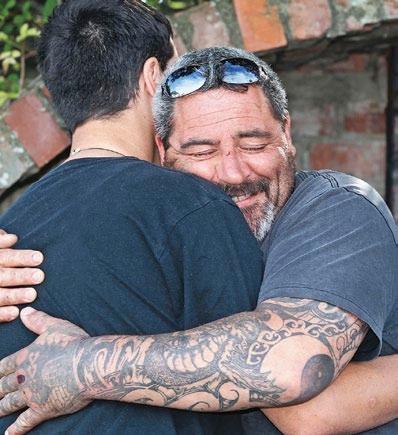
“Hey man, thanks so much bro,” Reedy said when he met volunteer coastguard Rhys Ferguson again. “I’m just glad you’re here,” his rescuer replied
Reedy knows the sea. He learned to dive near here—getting in the ocean with great white sharks every year. Now he looks down at his hands and sees his knuckles are bleeding. For a moment he panics. He flails and tries to pull his legs into his chest. He wills himself to be calm, to breathe.
Reedy looks about him. All this time, land has only been about two miles away. Taking off his yellowand-blue jacket, he lays it flat on the surface, hoping it will be a signal to helicopters or planes.
Just before he lets go of it he thinks back to a TV show about survival where the host told his audience to use everything around them to survive. He pulls out the string from the jacket’s hood and ties it around
his wrist and around the petrol canister’s grip. He awakes beneath the sea. The string saves him. At the surface he bursts into tears.
Reedy starts swimming, pushing out the canister with each stroke. After 40 minutes he’s no closer. The current is holding him still. Over the hours, he makes a second attempt to swim to land. Each time he tries, his energy is drained. The sun is dipping. He know he can’t make it through another night.
He begins to sing—the Eagles, Dire Straits. He recites haka—Maori war challenges he learned as a boy at boarding school. He talks to the petrol canister. He feels like he might be losing his mind.
There’s liquid inside the canister. Maybe if he can pour some out it will float better. He unscrews the lid and begins to tip it out, but the gasoline pours over his face and into his eyes. He is blind. Carefully, he screws the lid back on and begins to say goodbye to everyone he’s known. He begins to say hello to everyone he knows who’s already passed over.
Then he sees a plane flying high above him. He tries to wave, he tries to scream. It passes by.
the coastguard boat is nearing the middle of the strait when the call comes through that they should head towards the diesel slick. They turn west. Ferguson leans over the starboard side, keeping an eye out
| 06•2015 98
for anything. It’s not an easy task— someone in the water will have to be spotted while the boat hurtles across the waves at high speed.
Then Ferguson sees a flash of red about 330 feet away, slightly behind them. It’s after 6pm and the sun has almost disappeared. He tells the skipper to move towards it. Then he locks his eyes, raises his finger to point. He won’t drop his hand until the boat is right on its target.
w hen the sun had come up, Reedy felt so much hope. Now, as it skulks back over the horizon, he thinks, I can’t fight any more. He closes his eyes.
Then he hears it: Neeeeeeeeeeeee. He looks up and locks eyes with a spectacled young man on a boat who speaks the words he’ll never forget: “SURVIVOR IN THE WATER.”
It takes three of them to haul him aboard. Ryan takes off his thermal suit and wraps Reedy in it. They try
to wrench his grip from the petrol canister, but it’s clamped on. He doesn’t want to let go.
t wo months aFter the tragedy, Reedy returns to the Easy Rider, which remains 130 feet below the ocean. During the dive he pulls out a knife and carves a simple message into the hull: “Dallas was here.”
The search in Foveaux Strait continued through the night and the days that followed, but no other survivors were found. Of the nine aboard, only Dallas Reedy survived. The bodies of Rewai Karetai, Dave Fowler, Paul Karetai and Odin Karetai were never recovered.
Gloria Davis’s company, which owned the Easy Rider, was fined more than NZ$200,000 for causing “unnecessary danger or risk” to people on board, and Davis was personally fined NZ$3,000 and sentenced to 350 hours of community service.
One in ten people think HTML is a sexually transmitted disease (research conducted by voucher website)
51 per cent of people think stormy weather affects Cloud computing (research commissioned by software company)
40 per cent of people would save their dog over a foreign tourist (research conducted by a university)
source: Independent.co.uk
06•2015 | 99
r eader’s dI gest edited extract F r O m into th E black (Fair Fax media, 2014). © 2014 charles a N ders ON revealIng survey fIndIngs
What Is Forex?
FOREX IS THE COMMONLY USED TERM IN THE FINANCIAL SERVICES INDUSTRY FOR FOREIGN EXCHANGE , which refers to converting one country’s currency into another.
There are two sides of the foreign exchange market. The first is transactional, where a person needs to buy goods in a foreign currency, or a tourist needs to buy holiday money, and a bank or specialist provider (like UKForex) exchanges the two currencies for them.
Many things influence exchange rates, such as a country’s economic performance or geopolitical instability. Central banks also attempt to manipulate exchange rates by setting interest rates: generally, when interest rates are raised, a country’s currency becomes stronger and vice versa.
weakness of the Pound will still pull on your purse strings.
You only need to glance across the channel to see events affecting currency risk, such as the economic crisis in Europe. The real possibility of Greece pulling out of the Eurozone and the ongoing problems in its economy have seen Sterling reach seven-year highs against the Euro.
That’s great if you’re planning a trip to the Continent this summer. It’s less helpful if you’re a UK-based business who exports to Europe.
In our IncreasIngly global world, the fluctuatIons affect everyone
So whether you’re planning to buy a holiday home, receive an inheritance from overseas or import new products from China, how can you avoid getting stung?
tHe reaL rate
Currencies are also very volatile, their exchange rates move up and down constantly. In our increasingly global world, these fluctuations affect everyone. Even if you don’t travel overseas or run a multinational business, the strength or
The first thing to know is that the currency rate you see isn’t the rate you’ll get. When you see a GBP-EUR rate of €1.30, for example, that’s the interbank rate. It’s what the banks use to transact with one another. You should also see better rates if you’re transferring a larger
advertisement FeatUre

amount of money, so be sure to shop around for the best quote.
Hidden COsts and Fees
The currency provider’s margin isn’t all you’ll pay. Many financial institutions charge fees for carrying out a transfer. These tend to vary depending on the size of the transfer and whether you do it over the internet, by phone, or in a branch. In some cases if the amount of money you’re transferring is large enough the fee may be reduced or waived.
PrOteCt YOUrseLF aGainst CUrrenCY mOvements
If you have investments overseas, such as property, or a business that trades overseas, your costs can spiral if the exchange rate tips against you. You can defend against this risk with special financial products known as “hedging tools”. These may include “forward contracts” which allow you to lock in your rate now and deliver your funds at some point in the future. It protects you against the value of the currency moving against you down the line.
Transferring money abroad and fancy a chat? Call us today on 0207 614 4136. One of our experts will be available to discuss your exchange rates and money transfer requirements
MONEY
Savvy Overseas Spending
Avoid unnecessary bank charges and fees while abroad this summer with our top five tips
B Y N ick hill

Nick Hill is a money expert at the Money Advice Service. Visit money adviceservice. org.uk for details

Protect your money
By splitting your money into a mix of cash and cards, and keeping them separate in your bags and wallets, you’ll have flexibility as well as a back-up if some is lost or stolen.
Make sure you tell your bank you’ll be spending on your cards overseas, and keep a list of contact numbers for your banks separate to your cards in case you lose them and need to call to cancel. Also, check whether your travel insurance will cover you for lost cash. Your policy may have terms and conditions to follow, such as getting a police report.
Don’t leave your cash to the last minute
It’s always useful to take some local currency with you in cash to pay for essentials. While most foreign exchanges are commission-free, the rates vary widely.
Buying money last minute at the airport or ferry will work out the most expensive, as exchange rates and fees are usually higher. The best way to find the cheapest currency is to compare rates online. You’ll then be able to pick the money up on the high street or even get it delivered.
Look for fee-free cards
Using your debit and credit cards on holiday can be expensive —you’ll often have a foreign usage loading fee, which can add up to 3% to the cost. Some cards will also add a fee on when you withdraw money from a cash machine.
But this isn’t always the case. Several credit cards and some
| 06•2015 102 MONEY

debit cards have no loading fee or withdrawal fee, making them the cheapest way to spend.
Pay in the local currency
Sometimes you might be offered the choice of how to pay on your card—either in sterling or in the local currency. The exchange rate is usually far worse than the one you’ll get from your card provider, so if you’re offered the choice of how to pay on your card, always choose the local currency.
Choose prepay cards over travellers’ cheques
If you don’t want to use your debit or credit cards, then prepaid cards can be a good option. These can be loaded up with cash before you go, so you can spend without getting into debt or being charged interest.
These cards are growing in popularity as a safe alternative to travellers’ cheques, as the money you load onto the card is protected by a PIN. You’ll usually be charged a fee to take money out and to top up your funds though, and the exchange rate is set at the time you put money onto the card.
06•2015 | 103 Illustr A t I on by ADAM AVE ry
Keeping Scammers Away From Your Pension Pot

It’s been a big year for pensions so far, with rule changes opening up how you can access your retirement savings. However, these changes have also shined a light on people attempting to take that money away from you illegally. You can protect yourself and your pension pot by being vigilant and looking out for these warning signs.
1 You’re cold-called or contacted out of the blue about your pension.
2 The person contacting you will try to persuade you to take your entire pension as cash—or a large lump sum—and let them invest it for you.
3 They promise extra tax savings and/or very high returns from overseas investments, or new or “creative” investments.
4 You’re told they can unlock your pension before you turn 55.
5 They claim to know of loopholes that will allow you to get more than the usual 25% of tax-free cash.
6 You’e pushed to act quickly and they encourage you to transfer your pension quickly, and even send documents to you by courier.
7 Their credentials don’t prove they are who they say they are.
Remember, if an investment opportunity seems too good to be true, it probably is. If you think you’re being targeted by scammers or have made an investment you’re now worried about, you can raise the alarm by calling Action on Fraud on 0300 123 2040.
For more guidance on the new pension reforms, visit moneyadviceservice.org.uk/ en/pensions-and-retirement
© J o H n G o MEZ/Al AM y
| 06•2015 104 M on E y
Car-Tax Errors Could Get You Clamped
Rule changes last year pushed car tax online, but some drivers have been caught out and had costly fines or clamp-removal fees imposed.
New rules apply if you buy a second-hand car. These state that you’ll no longer be able to transfer any remaining tax on the vehicle. So as soon as the DVLA has been notified of the change of ownership, the old tax automatically stops and you’ll need to tax it afresh. You can also pay now by direct debit. This lets you spread the payments every month, every six months or every year. Payments will continue automatically until you tell the DVLA to stop them.
Another main change is you no longer need a car tax disc—number-plate recognition is now used to determine automatically whether a car is taxed or not.

WastiNg FOOd is WastiNg MONEY
the average household throws away £470 of unused or rotten food each year, according to love Food Hate Waste. that jumps to £700 for those with children.
here are three ways to save:
1. Plan what you eat Having a menu plan will help you only buy the food you need.
2. Freeze leftovers
If you’ve enough even for a small portion, see if you can freeze it. you can also put many other foodstuffs —from fresh herbs to gravy—in the freezer for later use.
3. check dates
A few times a week, check what’s in the fridge and cupboards and what needs eating. that way, you can avoid discovering mouldy half-open packs of food hiding at the back.
06•2015 | 105 R E ad ER ’s d ig E st © s H utt E rstock/ lI s A s
Lasting Power Of Attorney
The Myth and the Reality
Many people have heard of a l asting p ower of attorney (previously an Enduring Power of Attorney), but associate it with something you arrange later in life when you “start feeling iffy”. Here we will investigate some of the myths and realities surrounding mental incapacity and Lasting Power of Attorney.
myth Mental incapacity is something that only affects people in later life, through illnesses such as Alzheimer’s, so I don’t need to do anything just yet.
reality Accident or illness can strike at any time, often without warning. The consequences of failing to plan can be significant, as outlined in this article, so why leave something so important to chance?
myth If I suffer an accident or illness, my spouse or children will automatically be able to take over the running of my affairs as my next of kin.

reality Your spouse or children have no automatic right to act on your behalf. Without a Lasting Power of Attorney, they will be required to apply to the Court of Protection to be appointed as your Deputy – a long, complex, costly and intrusive process.
myth I can simply add my spouse or children to my bank accounts, as a joint account holder would just carry on as normal in the event of my mental incapacity.
reality Banks are guided by
advertisement FeatUre

the British Bankers’ Association to freeze both solely and jointly held accounts where one account holder loses mental capacity (they may allow pre-authorised payments).
myth When creating a Lasting Power of Attorney, it’s best to appoint my spouse and children to act together jointly.
reality Many poorly advised individuals
have fallen into this trap. Appointing family jointly means they must act together in all matters, rendering the Lasting Power of Attorney useless when one of the appointed family can’t act –incapacity or death is not an excuse!
myth If anything happens to me and a decision needs to be made about lifesustaining treatment, the doctor will automatically follow the wishes of my next of kin.
reality Only through a Lasting Power of Attorney can you give the people you trust the right to make choices about your health and welfare, including the ability to refuse life-sustaining treatment if you wish.
A Lasting Power of Attorney is often likened to an insurance policy – you hope you’ll never need it, but your family will be very grateful for your foresight if you do. It’s the only way to have your say about who you trust to manage your affairs and make things as simple as possible for your loved ones.
Reader’s Digest Legal is a service provided by the Collective Legal Solutions Group.
Call Reader’s Digest Legal today for your Free information pack on 0800 031 9516 and quote ref rdl2
LEGAL
Easy-to-prepare meals and accompanying drinks
Duck Breast Salad
By Rachel walke R

Rachel is a food writer and blogs at
thefoodieat.org
Serves 2
• 1 red chicory
• 1 orange
• 40g lamb’s lettuce
• 40g walnut halves
• 75g green beans
• 1 duck breast
There are lo T s of differen T ways of building a summer salad. Some might begin by picking a seasonal ingredient, others might find inspiration from the reduced aisle in the supermarket, or the green fingered among us could see what leaves have sprouted in the garden.
This recipe started with the excitement of discovering enormous duck breasts for £2.50 in the butchers. The duck season allows wild breeds such as teal, mallard and widgeon to be shot from September 1 to January 31, but the increase of farmed duck ensures reasonablypriced meat from varieties like Gressingham or Barbary all year round.
1. Preheat the oven to 180C.
2. Next, prepare the salad. Cut the red chicory at the base and tear away the leaves. Cut off the top and bottom of the orange, use a knife to slice away the peel and then cut between the membrane to divide it into segments.
• 1tbsp cracked black pepper
• salt
Dressing
• 3tbsps olive oil
• 1tbsp red-wine vinegar
• 1 shallot, finely diced
• 1tsp flat leaf parsley, finely sliced
3. Put the red chicory, lamb’s lettuce, orange segments and walnut halves in a salad bowl.
4. Top and tail the green beans and cut into two-inch pieces. Blanche in boiling water and then chill by running them under cold water. Add the green beans to the salad bowl.
food & d Rink | 06•2015 108
Photogra P hY b Y t im & Zoë h ill

5. Shake the olive oil, red-wine vinegar, shallot and parsley in a jam jar—and add any residual orange juice left from preparing the orange (a tablespoon or so of liquid can be squeezed from the membrane). Pour the dressing over the salad, toss to coat everything and then divide between two plates.
6. Season the duck with salt and press the cracked black pepper into the fatty skin side.
7. Heat a frying pan or skillet that can go inside the oven. There’s no need to add any butter or oil—when you put in the duck skin-side down, it leaches out its own fat. Reduce the heat and cook for five minutes until the skin turns golden and crisp, then move the pan to the oven and cook the duck breast for three more minutes on each side.
8. Let the duck breast rest for five minutes. Then thinly slice and serve on top of the two salads.
TRY THIS…
The flavours in this salad and dressing also go perfectly with beef. For a red meat alternative, quickly pan-fry onglet or hanger steak, slice into thin strips and serve as you would the duck.
06•2015 | | 109
Sink Some Sangria
The orange in T his mon T h’s recipe led me into sangria territory for the paired drink. In its purest form, the chilled wine punch can be a refreshing and elegant drink. All too often, though, it’s laced with a medley of spirits, sugar syrups and whole fruit salad. After a little experimentation, I settled on a simple trio: red wine, brandy and orangeade.
Sangria recipes often involve macerating the fruit, but this really isn’t necessary. The only rule I would stick to is avoiding the temptation of days-old wine. Sure, there’s no point using something top-notch, but sangria shouldn’t be an excuse to use the dregs. So chill something sensible, pick a safe selection of fruits and give sangria a second chance.

Recipe
• 15–20 large ice cubes
• 1 bottle of chilled wine
• 660ml chilled mixer (orangeade or lemonade, see below for tips)
• 50ml of brandy (optional)
• 1–2 oranges, thinly sliced in circles
1. Half fill a pitcher with ice.
2. Pour in half the bottle of wine and one can of mixer to start with.
3. Stir in the brandy and orange slices, and add equal amounts of wine and mixer until full. As it’s drunk, refill the jug in the same fashion.


■ Toro Loco Tempranillo, aldi, £3.79/bottle
■ Simply Garnacha, Tesco, £4.79/bottle
■ Aromatic and Citrus
Spanish White Wine, waitrose, £4.99/bottle
maximising The mixeR
■ a big percentage of sangria is made up of the mixer, so don’t scrimp. Fever-tree’s Sicilian lemonade and marks and Spencer’s pink cranberry lemonade all add flavour and fizz.
■ large ice cubes are key to a good sangria; they chill the punch instead of diluting it. try nisbets’ big ice cube tray (nisbets.co.uk).
■ if you’re catering for a big gathering, then don’t shy away from bag-in-box wines as a cost-efficient option.

| 06•2015 110 Food & d rink
© S hutt E r S tock/gr ESE i
Pudding of the Month

Easy Eton Mess
There are several tales about how this delicious pudding came about. But regardless of its origins, it’s served every June at the oldest ongoing school sporting fixture—the Eton versus Harrow cricket match. It’s also light, summery and easy to prepare.
Serves 4
• 4 ready-made meringue nests
• 300ml double cream
• 2tbsps Greek yogurt
• 250g raspberries and/or strawberries, washed and hulled.
1. Use your hands to break up the meringue nests.
2. Whisk the double cream into soft peaks and then stir in the Greek yogurt.
3. Fold in the raspberries/strawberries and the chunks of meringue until combined.

Preserves, Pickles and Cures: Recipes for the Modern Kitchen Larder by Thane prince, Amazon, £16.99.
BaRgain

carafe with cork stopper, Ikea, £4. Add cucumber or lemon slices to chilled water for a restaurant feel.
Blow-oUT

The smart scoop, Sage, by Heston
Blumenthal, John Lewis, £395.95. Make your own ice-cold summer treats.
Reade R ’s d igest 06•2015 | | 111 © t im h ill/ a lam Y
Book FOR MORE, GO TO ReaDeRsDigesT.co.Uk/FooD-DRink
3 Ways To Reduce Your Motor Insurance
Motor insurance is a legal require Ment; however the levels of protection you receive can differ significantly from policy to policy. As with home insurance, many insurers have “dumbed down” the motor insurance cover they now offer. A policy which is comprehensive in name may prove to be anything but, when it comes to making a claim.
You can reduce costs by avoiding the most common motor insurance traps and, more importantly, by having the right cover. Here are three top tips for areas to consider when purchasing your next motor insurance policy.

Check your cover
Policies differ and cheaper is not necessarily better! The small print of your car insurance policy is where the “cheap” often comes from. You may be surprised to learn that Comprehensive insurance
advertisement feature
is often cheaper than Third Party, Fire & Theft! Your priority should be the best value – not cheapest –policy. Does the insurer offer a courtesy car if your car needs repairs? Is breakdown cover included? Is there a dedicated claims team you can speak with should you need to make a claim?
TIP: Make sure the policy you choose suits your needs and matches your personal circumstances.
Don’t ignore the excess
The excess is the part of a policy you pay yourself in the event of a claim. A cheap policy often means a whopping compulsory excess is hidden in the small print. A very high excess can mean much lower premiums, but can defeat the purpose of having insurance. The compulsory excess is set by the insurer and the voluntary is set by the policyholder.
TIP: Always check the policy excess, especially if a motor policy seems cheap. There is a happy medium you can strike when setting your excess. Seek advice.
Taking your car abroad?
Many of us take our car to Europe, but not all insurers include European cover. Often the cheap quotes have many aspects of cover stripped out. EU cover is one area that many insurers delete and if you need it, it then becomes very expensive.
TIP: Remember to check your policy has EU cover if you need it. Don’t just buy on price.
Reader’s Digest insurance services is delighted to offer a range of motor insurance policies from leading insurers such as aviva, ageas, axa, allianz, Lv= and rsa. all of our recommended policies include free raC cover and access to a dedicated claims department as standard.
to discuss your motor insurance and to obtain a competitive quotation, call us today on 0208 069 3102. One of our expert advisers will help provide the motor insurance policy that matches your exact requirements.
Vivat Finance Limited trading as Reader’s Digest are an Introducer Appointed Representative of Higos Insurance Services Ltd trading as Reader’s Digest Insurance Services, who are authorised and regulated by the Financial Conduct Authority FRN no 302690
By a LIS on Cork

Home and interiors expert
Alison Cork runs luxury furniture and accessories brands alison athome.com and homeware clearance site oneregentplace. co.uk
Entertaining Ideas
Alison answers your questions on creating a dining area that’s perfect for sharing with guests
QI’m renovating my dining room, but I’m stuck on the kind of lighting I should choose. Any tips?
aLighting is perhaps the easiest way to establish a certain ambience in any setting. If you’re trying to achieve a more traditional look, try classic chandeliers and charming candles, which are always an elegant option. For modern spaces, geometric designs, giant bulbs and rustic pendant lights will create more of a fun feel. Be sure to add dimmer switches, whatever you choose, so you can create the right mood for every occasion.
Gardeners’ Diary
Don’t get too distracted by the lovely weather this month and be sure to stay on top of those all-important jobs.
■ Keep down weeds by hoeing borders frequently.
■ Plant out summer bedding.
■ Sow seeds of annual plants.


| 06•2015 114 home & Garden
© Norther N Lighti N g Be LL Pe N d AN tgree N , c L oud B erry L ivi N g.co.uk / © o J o i m A ges Ltd/A LA my

QHow do I know whether to buy a rectangle, oval or round dining-room table?
aPicking a dining-room table is about so much more than shape preference. The size, shape and style of your room should equally factor into the decision. Rectangular tables seem to be the popular choice these days, thanks to their ability to accommodate extra guests and suitability to most modern dining rooms. Oval shapes are very similar to rectangular tables in most ways, but provide the allusion of more space thanks to rounded corners. On the other hand, smaller dining rooms could benefit greatly from intimate square or cosy round tables.
ImpreSS dInner GueStS
Create an elegant dining space that’ll bring people together no matter the occasion.
perfect personalisation Photos, unique decorations and conversationstarting artworks are more likely to make guests and your family feel at home. don’t be afraid to inject character to your dining room. Scoop Bowl (£15; in-spaces.com).

Chic, comfortable chairs you would be hard pressed to keep anyone at the table with uncomfortable seating. instead, opt for upholstered, cushioned seating that you can truly relax in. Fenice Dining Chair (£1,090; natuzzi.co.uk).
table manners

empty dining tables are the perfect place to show off your style. Adorn your table with centrepieces and other accessories that you can alternate with every season. Nina Campbell Diamond Jewel Vase (£38; englishabode.com).

06•2015 | 115
© Nov A mo B i L i Argo o v AL d i N i N g tABL e, gomoder N .co.uk
Get the Look: Dashing Dining
Prepare your dining room for the social season with these beautiful furnishings






1. Rustic White Double Display Cabinet, £784, hampshire furniture.co.uk
2. Recycled Glass Vintage Milk Bottle, £14, ellieellie.co.uk
3. Madison Dining Chair, £273, sweetpeaandwillow.com
4. Lace Candle Chandelier, £240, vivalagoon.com
5. Provence Kitchen Storage Jars, £12 each, houseoffraser.co.uk
| 06•2015 116 home & gA rde N
FOR MORE, GO TO readerSdIGeSt.Co.uk/home-Garden © mA i N im A ge: eA to N s oft g rey d i N i N g f ur N iture c o LL ectio N , du N e L m.com
2 1 4 5










to order (Please
0844
RDP027
FREE POSTAGE ONALL ORDERS From turning hems to words of wisdom… Books to leave you in stitches! Big Book of Online: shop.readersdigest.co.uk Phone: Only £9.99 B10260 Reader’s Digest Complete Guide to Sewing Only £7.99
How
quote RDP027 when ordering):
332 8080 (8am-8pm Mon-Fri, 9am-5pm Sat-Sun) By Post: Reader’s Digest, FREEPOST RTHR-LLRY-ZHYS, Ringwood, BH24 1HD (Cheques should be payable to Reader’s Digest, and please remember to quote
and include your full name and address, along with the details of the item(s) required)
A Smarter Way To Tell The Time
By olly m A nn

Olly is a technology expert, LBC presenter and Answer Me This! podcaster
Apple WAtch, from £299
It’s finally here! Well, sort of—if you haven’t ordered one yet, you won’t get your hands on some models until autumn. My suggestion is to wait until version two anyway, as this first iteration doesn’t even feature GPS. But millions of punters are already sold on the “Digital Crown” scroll wheel, “Glances” notifications and 38 different strap designs. The rest of us may wonder what’s wrong with wearing a watch that simply tells the time.


Apple App of the month: periscope, £2.49
The best description I can come up with for Twitter’s latest innovation is “global Facetime”. It accesses your iPhone camera, enabling you to

stream live footage of your life to viewers around the world. Or if you’d rather be a voyeur, you can just watch. It’s an astonishing technical feat, weirdly compelling and quite possibly the future of news broadcasting.
| 06•2015 118 Technology
pAlm mAssAger ii, £299
This “digital pulse massager”, which I spotted at The Gadget Show Live, looks like an iPod connected to a defibrillator. Stick the adhesive pads to your shoulders, back or legs (depending on whether you want pain alleviation or a relaxing massage) and choose between nine different modes of muscle stimulation. The effect is achieved purely through electric pulses (and is therefore unsuitable if you have a pacemaker), but it really feels like your own personal masseuse.

fireBox poWer pen, £24.99
Which items do you most frequently forget upon leaving the house? I bet pen and phone charger are near the top of the list. This gadget, ostensibly a ballpoint pen (albeit a heavy one), combines the two. The end cap conceals a USB connector; the lower barrel unscrews to reveal a micro USB/ iPhone adapter. A few hours’ charge will give most smartphones a 30% battery boost. There’s even a rubberised tip so the pen can be used as a stylus too.


Android App of the month:
holidAy pirAtes, free Sometimes technology makes it harder to choose a holiday, rather than more convenient— think of the hours you spend scanning photos and reviews before selecting a destination. But if you’re available for last-minute getaways, this straightforward app, which gathers some truly astonishing deals from the web, will find you a bargain break—if you’re not too choosy!

06•2015 | 119
FOR MORE, GO TO reAdersdigest.co.UK/technology
By Geor G ina yates

Georgina is a fashion and beauty editor for numerous travel titles and a blogger at cargocollective. com/withgeorgia
Who Wants To Be A Milliner?
Royal a scot has always been about mo R e than ho R se R acing; it’s a social occasion that gives the gentry the opportunity for unashamed peacocking. But standing out from the crowd while adhering to its strict dress codes can be a sartorial challenge. Traditional wedding attire poses a similar problem.
Holly Young is a milliner who offers an answer. She specialises in bespoke commissions—last year she made 30 unique headpieces for an Ascot scene in the recent film Kingsman: The Secret Service. (The scene didn’t make the final cut, but that’s Hollywood for you.) She decided to pursue a career as a milliner while studying Costume Design at the prestigious London College of Fashion.
“One of our projects was to make a Victorian bonnet.
Fine Lines
From candy stripes to technic-colour, this season’s stripe comes in many guises.
■ If you find flip flops uncomfortable, there’s FitFlops, now in a fetching candy stripe red (£60; fitflop.co.uk).
■ I love the sandy colours used in this jacquard fabric dress (£50; fatface.com).
■ A classic A-line cut and simple stripes make this skirt great for both work and play (£55; lauraashley.com).



| 06•2015 120
Fashion & B eauty

I loved that it employed 3D sculpture and sewing. Then I spent six weeks in the English National Opera’s millinery department, and I decided that it was what I wanted to do for the rest of my life.”
Following her degree, Holly cut her teeth working for some esteemed industry names: Justin Smith, Jane Taylor and Philip Treacy. In 2010, she decided to strike out on her own, but working in such a niche field is not without its obstacles.
“People often think I’m telling them that I’m a millionaire! Hats and accessories are such specific products, so marketing is quite hard. Word of mouth is the best strategy, but that takes time.”
Customers are welcome to book an appointment with Holly at her studio in Truro, Cornwall. She also holds workshops if you fancy trying your hand at a new skill. ■ take a look at holly’s range of fascinators and hats at hollyyoung boutique.com

Good Foundations
Every now and then, a beauty product is released that really does its job well. Clinique’s unique range of Superprimers falls into this category. There are several colours to choose from, each dealing with a particular gripe, from redness to sallowness. My favourite is the pink Colour Correct dullness Primer (£20; clinique.co. uk), which lends skin a healthy glow.
Primers, used after moisturising, help to smooth out the skin, filling in fine lines and providing an even base for your foundation. They also help your makeup to stay put, meaning a trusty primer is essential for events such as weddings or a day at the races.

06•2015 | | 121
If music be the food of love, feast your ears on these…

Voices of Angels
Laudate Domimum • Palus
Angelicus • Comfort Ye, My People • Shepherd’s Farewell
• Ave Maria
•
Miserere Mei… 46 tracks… R50008 CD £9.99
How to order




Classical Anthems


Dies Irae and Tuba Mirum (Verdi)
• Requiem Aeternam and Kyrie Eleison (Mozart) Magnificat (Bach)










•
• Gloria In Excelsis Deo (Vivaldi)… and more!


Online: shop.readersdigest.co.uk
Phone: 0844 332 8080

513469 £6.99
513469 CD £6.99

(Please quote RDP027 when ordering)

(8am-8pm Mon-Fri, 9am-5pm Sat-Sun)
By Post: Reader’s Digest, FREEPOST RTHR-LLRY-ZHYS, Ringwood, BH24 1HD (Cheques should be payable to Reader’s Digest, and please remember to quote RDP027 and include your full name and address, along with the details of the item(s) required).










POSTAGE ON ALL ORDERS!
FREE










Green-Fingered Fashion
Reve R ed s wedish designeR gudRun sjödén has been celebrated over her 40-year career for her innovative vision and extensive environmental work.
Gudrun’s passion for nature and the arts was stimulated by her upbringing. She explains: “My father was a farmer and my mother, a strong woman, always seemed to be doing something with her hands—there was a lot of knitting, sewing and crocheting.”
Later, the spirit of the strong, independent woman would become an integral part of her brand’s identity, and she’s been celebrated for using women of all ages in her advertising campaigns.
Gudrun wants her garments to be enjoyed by her customers and to enhance the environment in equal measure: “Sustainable fashion isn’t

only about using organic cotton,” she says. “It’s a lot bigger than that. What kind of packing material do you use? Do you ship it by boat or use air freight? We use boat freight for over 60% of what we produce, which I’m really proud of.”
With stockists across the globe and multiple environmental projects, it seems that Gudrun’s specially designed packaging is sustainable as well as thriving!
■ Visit gudrunsjoden.com for details
Blemish Control
Ever had a break-out that needs fast treatment? Try ibuki multi solution skin Gel (£30; shiseido.co.uk), a multifunctional solution to a variety of skin problems, ranging from red patches to blemishes and open pores.
■ Visit shiseido-europe.com for details

06•2015 | | 123 FOR MORE, GO TO readersdiGest.Co.uK/Fashion-Beauty
A romantic tale of lives lived in parallel, and an old-school Cold-War thriller with a hint of déjà vu
June Fiction
b y J AME s
WA lT o N

James writes and presents the BBC Radio
4 literary quiz The Write Stuff
The Versions of Us by Laura Barnett (Weidenfeld & Nicolson, £12.99) How would your life be if you hadn’t met the most important person in it—especially as the meeting may have been entirely accidental? This is the question posed by Laura Barnett’s first novel, which already looks set to become one of the summer’s big reads. In the first chapter, Eva bumps into her future husband Jim in 1958 when she punctures her bike tyre on a nail and he stops to help. In the second, she misses the nail and the meeting never takes place. In the third, the puncture, the meeting and the instant fondness all happen— but then Eva leaves Jim after discovering she’s pregnant by her existing boyfriend. And from there, the book alternates between the three stories to reveal the consequences.

The theme of alternative and unlived lives is certainly not uncommon. Barnett, though, tackles it with flair, tracking Eva and Jim all the way to 2014. She also avoids the idea that we only get one chance at happiness—instead, the pair have plenty to be happy about, and to regret, in all three versions.
NAME THE AUTHoR
(Answer on p128)
Can you guess the writer from these clues (and, of course, the fewer you need the better)?
1. Her first six novels had titles
that were women’s names.
2. Her first blockbuster is republished this month for its 30th anniversary.
3. It introduced her long-running cad Rupert Campbell-Black.
| 06•2015 124
books
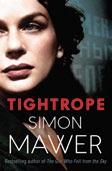
Tightrope
by Simon Mawer (Little, Brown, £16.99)
Simon Mawer’s last book
The Girl Who Fell from the Sky marked a serious change of direction: from the literary novels that established his reputation to a more conventional thriller about a woman dropped into wartime France. That same woman, Marian Sutro, returns in Tightrope—and so does Mawer’s full commitment to respecting the thriller conventions.
The new book begins in 1945 with Marion back in Britain after a spell in Ravensbrück concentration camp. Not surprisingly, she finds ordinary life a struggle and can’t shake off the feeling that her existence is another cover story. So when she’s asked by her ex-handler to dust off her spying skills for the Cold War, her reaction is almost one of relief.
If nobody had written a Cold-War thriller before, what follows might seem like a startling masterpiece, full of narrative twists, moral ambiguity and an all-pervading atmosphere of mistrust. But any fan of spy fiction will have come across these elements many times. Mawer arranges them deftly enough, and Marian herself is a compelling heroine. Even so, this is a curious mix: on the one hand, a smart and often gripping novel; on the other, a book whose sense of familiarity never quite goes away.
pApERbAcks
■ A Man Walks On to a Pitch by Harry Redknapp (Ebury, £7.99). Stories from Redknapp’s 50 years in football—which end up providing a winningly indiscreet history of the British game since the 1960s.
■ A Perfect Life by Danielle steel (corgi, £7.99). The latest heart-warmer from the bestselling author, this time about a high-flying newsreader and her relationship with her daughter.
■ Engel’s England by Matthew Engel (profile, £9.99). A leading journalist goes in search of traditional counties and finds their identities alive and well, in a book that mingles affection with an eye for irresistible facts.
■ The Bone Clocks by David Mitchell (sceptre, £7.99).
Another centuries-spanning read from the author of the allconquering Cloud Atlas. Quite possibly his most bonkers novel yet.
■ Yesterday, Today, Tomorrow by sophia loren (simon & schuster, £9.99). The actress looks back on her extraordinary life and career.

06•2015 | | 125
© “Sop HIA Lo R en L.A.” B y A LLA n WARR en
The legendary DJ, affectionately known as Whispering Bob, has more musical anecdotes than you can count in his autobiography RD’s REcoMMENDED READ
It’s Only Rock And Roll
BoB Harris, perHaps ratHer improBaBly, grew up as the son of a Northampton policeman— the same policeman who arrested P J Proby for splitting his trousers on stage. Then in 1966, aged 20, he moved to London where his new-found hippiedom soon saw him writing for underground magazines about such impeccable Sixties subjects as “a mixed media group called The Exploding Galaxy, led by a kinetic sculptor called David Medalla”.
But the real turning point came when he heard John Peel on pirate radio and decided he wanted to do the same thing: “turning people on to the most amazing music I could find”. Within a few years he had his own Radio 1 show and

Still Whispering After All These Years by Bob

Harris is published by Michael O’Mara Books at £20. Readers can order it for the special price of £15 with free p&p while stocks last by calling 01903 828 503 and quoting BH/RD (UK mainland only).
was presenting The Old Grey Whistle Test on TV. Yet if his rise was almost effortlessly smooth, the rest of his career has been anything but. The arrival of punk in the late 1970s saw him written off as “the Ken Barlow of rock”, and by the early Eighties, his idea of a big break was replacing Timmy Mallett as the presenter of Drive Time on Radio Oxford. (And he was even sacked from that.)
His autobiography records the ups
| 06•2015 126 B oo KS
© Le BR e CHT Mu SIC A n D A RTS pH o T o L IBRAR y/A LAM y
and downs of both his personal and professional life with an impressive lack of bitterness and a touching sense of puzzled pride at the nationaltreasure status he finally seems to have acquired. But it also brings us lots of great stories about the rock stars he’s met—and he’s met most of them. Nonetheless, whether hanging out with Led Zeppelin in their pomp (not a job for the faint-hearted) or visiting John Lennon in New York, he never loses the excitement of a true music fan.
We join him here in LA in 1974, where he and his producer Jeff Griffin are making a Radio 1 documentary about the Beach Boys. Much to their surprise, the band’s main man Brian Wilson—by then an increasingly eccentric recluse—has suddenly granted an interview…
TWo sToRiEs fRoM STiLL
WhiSPEring AboUT ThE OLd grEY WhiSTLE TEST
I was intrigued that Lou Reed needed a minder on each shoulder when he joined me in the studio. Then I noticed that those two guys were literally supporting him, one under each arm, the toes of his black boots dragging across the floor as they dumped him into a chair beside me. I looked at him as he sat there motionless, his eyes closed, 20 seconds before we went live. I did the introduction and asked him the first question. The few seconds of subsequent silence felt like a day and a half. Then, from deep in his throat, came a kind of growl, developing into an approximation of speech. It was as if someone had slowly turned a key in his back, as he wound himself up enough to give me some kind of answer…
On another night Keith Richards arrived swigging from a bottle of Jack Daniels, half-empty by the time he ambled through to join me. By the end of the interview the bottle was finished, yet he was completely unaffected. The myth was reality. ‘‘
We checked in at the security post on the perimeter of the exclusive Bel-Air estate as the guard phoned ahead to get clearance from the Wilson family to open up the electronic gates and let us through. Brian’s wife, Marilyn, was waiting for us at the house and took us through a thick, oak doorway, down a short staircase and into a long, high-ceilinged, wood-panelled room, empty except for two leather sofas, a mahogany coffee table and a white piano. As Jeff set up the recording equipment we could hear what sounded like electronic music,

06•2015 | 127 R EADER ’s Dig E s T
thumps and wailing noises coming from somewhere in the building. Marilyn seemed unconcerned. She and I had met before, and she was friendly, relaxed and happy to talk.
to say. This was a serious question. Brian stood for a minute or so in the silence, examining the microphones. Finally, he looked up and around the room, then walked over to the piano.
Here we were, in Brian Wilson’s piano room, about to hear an exclusive preview of a brand new song
We’d been recording for ten or 15 minutes when suddenly the door burst open and there at the top of the stairs, hands in pockets, stood Brian Wilson. He looked dishevelled and uncertain, transferring his considerable weight uncomfortably from one foot to another, staring at the polished wood floor.
Marilyn explained why we were there and, after standing for a while making up his mind what to do, he slowly came down into the room towards us, staring intently at the stereo microphones Jeff had placed in stands on the table. ‘What is that?’ was the tentative, straight-faced enquiry, as he circled the table to look at the microphones more closely. ‘Is that a submarine?’ Jeff and I looked at one another, not really knowing what

AND THE NAME of THE AUTH o R is… Jilly Cooper, who began with the novels Emily, Bella, Octavia, etc, before publishing Riders in 1985.
‘I tell you what, you guys, I’ll play you a song.’
This was an incredible moment, more than we’d ever hoped for. Here we were, in Brian Wilson’s piano room, about to hear an exclusive preview of a brand new song. The feeling was electric. Jeff clicked the tape machine into record mode as Brian lifted the piano lid and prepared to play. He paused for a moment, then wrung his hands and looked across at Marilyn. ‘Er...honey, what’s wrong with the piano?’
‘Oh, Brian, don’t you remember?’ she smiled sympathetically. ‘It’s being fixed. You know...they’ve taken some of the keys with them.’
My heart sank as I saw the gap under that piano lid, looking like a huge open mouth without any teeth. Brian sat for a moment, thinking. Then, without another word, he slowly got to his feet, stuffed his hands back into his pockets, and ambled reflectively out of the room. A few moments later, the electronic music started again.
| 06•2015 128 B oo KS
’’ © Jeff Mo R g A n 03/A LAM y
Books
th At C h A nge D my life

meera syal is a writer, comedian, singer, playwright and actress. she was awarded a CBe this year for services to drama and literature. her new novel The House of Hidden Mothers is published by Doubleday this month.
To Kill a Mockingbird
By Harper Lee
I read this when I was 13, the perfect age to appreciate the big issues it addresses in a brilliantly accessible but emotional way. Atticus Finch shows us the importance of standing up for what’s right, even when no one around you is supportive and you know you’re going to lose. The book gave me guidelines for life, and that’s a very special gift.
Behind the Beautiful Forevers
By KatHerine Boo

rest of us. They have the same desires and ambitions, and make the same mistakes. Boo shows us that we’re all connected. We’re quick to judge how the poor behave, but this book highlights how much harder it is to lead a corrupt-free life when your options are so reduced.
Pride and Prejudice
By Jane austen


It’s hard to believe this book is true—it reads like a novel but it’s the faithful, unsentimental representation of the three years Boo spent in a Mumbai slum. While the dwellers’ lives are full of drama, the characters are shown to be no different to the
There’s so much in Austen’s writing that resonates with Western and Eastern culture. Indeed, when I first read Pride and Prejudice, I thought the characters could be Indian—the way unmarried girls are paraded around and the parental worries about what to do with your daughter when she doesn’t have much of a dowry. Austen was a quietly subversive feminist writer. In Elizabeth Bennett you have a girl who’s too intelligent to play the game, and I really related to that. As told to Caroline Hutton
06•2015 | 129 © photo: Asi A n Wom A n mA g A zine
FOR MORE, GO TO reaDersDiGest.Co.uK/BooKs
You Couldn’t Make It Up
Win £50 for your true, funny stories! Go to readersdigest. co.uk/contact-us or facebook.com/readersdigestuk
my six-year-old son is used to seeing me stick a tissue down my bra when I have a cold, because the outfit I’ve got on has no sleeves or pockets.
While at a school dinner party I got one out discreetly, but my son exclaimed in a loud voice to anyone who was listening, “My mum is always putting tissues down her bra!”
deena Colworth, Cambridge
my mother moved towns and went for her first visit to her new doctor’s surgery. The doctor looked through her extensive medical paperwork containing her health history and then looked at my mother.

12 years to develop a love for my children before turning them into teenagers.” Jenna simmonds, London
“I’m pleased to say,” he told her, “with utmost certainty, that you look a whole lot better in person than you do on paper.” stephan Bryn, Merseyside
i Called in on a Friend who was in the middle of an almighty row with her teenage triplets.
“Isn’t Mother Nature wonderful,” she told me afterwards, “giving me
when i retUrned a reCipe Book to my library, the librarian noticed there was water damage to the book and asked me to pay for it. I agreed, but as I wasn’t carrying any money, I said I would pay next time I was in.
There was a different librarian on duty the next day when I dropped
© STEVE WAY | 06•2015 130 FUn & Games
by with the money. She swiped my library card and my account came up on the computer screen.
In the “notes” section, it read: “Customer says he’ll hand in the £10 next time, but I don’t think he will.”
neil harrison, Edinburgh
i was on a Family oUtinG to the zoo with my son when he said, “Look, Dad! It’s a frickin’ elephant!”
I was shocked by his language and embarrassed, as everybody turned to look at us.
“What did you just call it?” I asked.
“It’s a frickin’ elephant,” he replied. “It says so on the picture!”
And so it did: “African elephant.”
Jason trUBy, Hertfordshire
havinG JUst reloCated to a small village, I was still trying to find my way around. I asked a neighbour if she could recommend anywhere to buy gardening tools.
“Ooh, let me think,” said my neighbour. “Do you know Donatelli’s in Hexham? About ten miles from here. Above the greengrocers. Next to the Post Office. Everyone calls it Donny’s. You must know Donny’s.”
I said I didn’t, but that I was sure I could find it.
“You turn left at Donny’s,” she continued. “It’s a sharp bend, so you always have to be careful there. Then up the steep hill, past the garden centre—they’ve got a little wooden wheelbarrow at the entrance with
flowers in, petunias I think. If you keep going past the infant school and newsagents, you’ll see a sign for the racecourse. There’s an immediate right turn that takes you down a little lane. Or you can go a bit further along where there’s a proper level crossing and a manned signal box. Albert who lives next door to me usually sits in it. Apart from Wednesday—that’s his day off.”
She continued, “Well, after the railway line there’s a T-junction and you follow the road until you get to a long, low wooden building with three doors. Green, I think, or it could be brown. Well, the third door along, at the end, leads to a small warehouse with a little shop attached to it called Herman’s Hardware. For homes and gardens.”
I was busy taking all this in and replied, “That’s great. Thank you very much. I’ll head over to there.”
“Oh no, love,” she replied. “He closed down years ago. So you need to go to the big DIY store. Centre of town. Can’t miss it.”
marita Berndt, Northumberland
my Brother edward went into a barber shop to have his hair trimmed. Enquiring about the price, he was told it would be £15.
“It can’t be—I am nearly bald,” protested Edward.
“Well, it’s £5 for the cut and £10 for my search fee,” was the response
Jill Cohen, Leeds
r eader’s d i G est 06•2015 | 131

Must-Haves for Dog Owners
As selected by Reader’s Digest
Only £15.99
P10064
Ionic Pet Brush
RRP £19.99



This ingenious brush will banish fleas and brush away smells as it untangles pet hair to leave a well groomed and odour free coat and a comfortable pet. Completely safe and easy to use!
How to order



















(Please quote RDP027 when ordering):
Online: shop.readersdigest.co.uk

Only £5.99






P10379
Dog Bone Toothbrush
RRP £6.99
Let’s face it. There’s not a dog in the world that doesn’t have bad breath. This toothbrush uses dental nubs to clean and remove plaque and tartar.

Phone: 0844 332 8080 (8am-8pm Mon-Fri, 9am-5pm Sat-Sun)
By Post: Reader’s Digest, FREEPOST RTHR-LLRY-ZHYS, Ringwood, BH24 1HD (Cheques should be payable to Reader’s Digest, and please remember to quote RDP027 and include your full name and address, along with the details of the item(s) required)
FREE
POSTAGE ONALL ORDERS
it pays to increase your
Word Power
Each week, merriam-webster.com highlight a word that’s in the news. Here’s a recent sampling from their Trend Watch section. Test yourself to see how current you are, and then check the next page for answers.
By Emily Cox & H E nry r at H von
1. amnesty (‘am-neh-stee) n
A: treason. B: pardon. C: safe haven.
2. laconic (‘la-con-ik) adj
A: short of breath. B: sarcastic. C: using few words.
3. repudiate (rih-‘pyu-dee-ayt) v
A: overthrow. B: refuse to accept or support. C: divulge.
4. fracas (fra-‘ca) n—A: type of fruit. B: noisy quarrel. C: colourful scarf.
5. sovereignty (‘sahv-er-en-tee)
n—A: full knowledge. B: supreme power. C: communal state.
6. conflate (kon-‘flayt) v—A: barter or deal. B: ignore. C: confuse or combine into a whole.
7. intransigence (in-‘tran-sih-jents)
n—A: stubbornness. B: hard travel. C: secret information.
8. solipsistic (soh-lep-‘sis-tik) adj—A: highly egocentric. B: slick. C: applied to the lips.
9. subterfuge (‘sub-ter-fyewj) n
A: deceptive stratagem. B: underwater dwelling. C: cheap replica.
10. gentrification (jen-treh-feh‘kay-shehn) n—A: gender switch. B: uncultured upbringing.
C: displacement of the poor by the affluent.
11. inherent (in-‘hir-ent) adj
A: inborn. B: granted by a will.
C: leased for low cost.
12. eponymous (ih-‘pah-neh-mes) adj—A: unsigned. B: opposite in meaning. C: named for a person.
13. intrepid (in-‘treh-pid) adj
A: stumbling. B: unpleasantly hot.
C: fearless.
14. sectarian (sek-‘ter-ee-an) adj—
A: related to a horse. B: of religious factions. C: having six parts.
15. culpable (‘kuhl-peh-buhl) adj
A: blameworthy. B: likely to happen. C: not competent.
06•2015 | 133
answers
1. amnesty—[B] pardon. “Whether or not to grant amnesty to illegal immigrants is a hot political issue.”
2. laconic—[C] using few words. “The late cricket commentator Ritchie Benaud was famous for his laconic style.”
3. repudiate—[B] refuse to accept or support. “The new Greek government wants to repudiate Greece’s debts.”
4. fracas—[B] noisy quarrel or brawl. “Jeremy Clarkson was suspended after ‘a fracas with a BBC producer’. ”
5. sovereignty—[B] supreme power. “Ukraine will not settle its conflicts with Russia until it regains full sovereignty over Crimea.”
6. conflate—[C] confuse or combine into a whole. “The media tends to conflate Britain and England.”
7. intransigence—[A] stubbornness. “Former prime minister Margaret Thatcher’s intransigence in negotiations was recently revealed in archive files.”
8. solipsistic—[A] highly egocentric. “Some view Facebook as a simply solipsistic internet forum.”
9. subterfuge—[A] deceptive stratagem. “The use of subterfuge by journalists is sometimes justified in the public interest.”
10. gentrification—[C] displacement of the poor by the affluent. “Lambeth council has faced criticism for the rapid gentrification of Brixton.”
11. inherent—[A] inborn. “Activities such as skydiving, skiing and whitewater rafting carry an inherent risk, regardless of the number of precautions taken.”
12. eponymous—[C] named for a person. “Who was the original Oscar behind the eponymous statuette?”
13. intrepid—[C] fearless. “After ‘stealing’ a block while playing, Prince George was called ‘very intrepid ’. ”
14. sectarian—[B] of religious factions. “The UN has warned of ‘further sectarian violence’ in Iraq.”
word of tHE day*
vanguard: foremost part of an advancing army or naval force.
alternative suggestions:
“security guys for Fedex.”
“What a dutch musketeer shouts when adopting his duelling stance.”
“a guardian against vanity.”
15. culpable [A] blameworthy. “Oscar Pistorius was found guilty of culpable homicide in South Africa.”
voCaBulary ratings
9 & below: up-to-date
10–12: in the know
13–15: newshound
| 06•2015 134 Word p o W er
*POST YOUR DEFINITIONS EVERY DAY AT faCEBooK.Com/rEadErsdigEstuK
£1,000 Prize Draw
Register online for our monthly £1,000 cash prize draw.
You will be sent daily codes via email to activate your draw entry.
You can only enter once per day using your unique daily code, however you can register an entry every single day to increase your chances of winning.
GOOD LUCK!






Entering is Quick, Easy and FREE! www.readersdigest.co.uk ONE WINNER Every Month!
BrainTeasers
Challenge yourself by solving these puzzles and mind stretchers, then check your answers on page 139.
SECTIONS
Can you divide this picture into four sections by drawing three straight lines? Each section should contain the eight different shapes.
DO ThE MaThS
Use five mathematical symbols (+, −, ×, ÷, √) to complete the equation. Note: you must use each one once and only once.
| 06•2015 136
? 25 ? 5 ? 9 ? 32 ? 8 = 4 FU N & Ga MES
TRIaNGLES
How many triangles are there in the figure below?
NUMbER SEaRCh
The number 987645 appears just once in this grid and occurs in a straight line, running either backward or forward in either a horizontal, vertical or diagonal direction. Can you find it?
CaRDS
Which card belongs in this set?
06•2015 | | 137
a b C
9 8 7 6 4 9 8 7 6 9 8 7 6 8 9 4 5 9 8 7 6 4 8 9 6 4 7 8 9 6 4 9 5 9 9 7 8 7 9 9 7 8 5 7 8 6 8 4 6 8 5 4 9 6 7 6 4 7 5 7 8 9 7 6 4 8 6 4 5 5 6 9 7 8 6 9 4 5 7 8 9 4 6 4 5 9 7 8 6 5 4 6 9 8 6 4 5 4 7 7 8 9 9 4 5 6 7 9 8 7 7 8 9 7 7 7 5 4 5 7 8 6 9 6 6 8 5 4 8 6 9 8 7 6 9 6 9 8 7 6 5 4 7 8 9 6 9 8 7 6 5 4 4 6 7 8 5 4 6 8 9 8 7 8 9 6 7 8 9
| 06•2015 138 TIME FOR TEa Two quick and easy teatime crosswords. 1 aCROSS 01 Simple (4) 03 Root vegetable (6) 06 Budapest’s country (7) 07 Suspend (4) 08 Colour (4) 09 Go in (5) 10 Ale (4) 12 Vow (4) 15 Idea (7) 16 Motive (6) 17 Corrosion (4) ERSwaNS :crossa 1 Easy 3 Carrot 6 Hungary 7 Hang 8 Blue 9 Enter 10 Beer 12 Oath 15 Thought 16 Reason 17 Rust :ownD 1 Earth 2 Younger 3 Cage 4 Royal 5 Three 8 Brother 10 Baker 11 Extra 13 Heart 14 Burn DOwN 01 Soil (5) 02 Not as old (7) 03 Animal pen (4) 04 Regal (5) 05 Number (5) 08 Family member (7) 10 Bread maker (5) 11 Additional (5) 13 Body organ (5) 14 Scorch (4) 2 3 4 5 6 7 8 9 10 11 12 13 14 15 16 17 BR ain TE as ER s
BrainTeasers: Answers
CaRDS
B. Only odd-numbered cards are in the set.
£50 pRIzE qUESTION
answer published in the July issue
These shapes follow a pattern. Can you spot what it is and work out what should be in the empty space to complete the pattern?
The first correct answer we pick on June 7 wins £50!* Email excerpts@readersdigest.co.uk
aNSwER TO May’S pRIzE qUESTION
50% aND ThE £50 GOES TO… Trevor Johnson, Wolverhampton
06•2015 | | 139
ThE MaThS
+ 5 – 9 × 32 ÷ 8 = 4 TRIaNGLES 32
SEaRCh 9 8 7 6 4 9 8 7 6 9 8 7 6 8 9 4 5 9 8 7 6 4 8 9 6 4 7 8 9 6 4 9 5 9 9 7 8 7 9 9 7 8 5 7 8 6 8 4 6 8 5 4 9 6 7 6 4 7 5 7 8 9 7 6 4 8 6 4 5 5 6 9 7 8 6 9 4 5 7 8 9 4 6 4 5 9 7 8 6 5 4 6 9 8 6 4 5 4 7 7 8 9 9 4 5 6 7 9 8 7 7 8 9 7 7 7 5 4 5 7 8 6 9 6 6 8 5 4 8 6 9 8 7 6 9 6 9 8 7 6 5 4 7 8 9 6 9 8 7 6 5 4 4 6 7 8 5 4 6 8 9 8 7 8 9 6 7 8 9
SECTIONS DO
√25
NUMbER
R E a DER ’ S D IGEST
Laugh!
Win £50 for every reader’s joke we publish! Go to readersdigest. co.uk/contact-us or facebook.com/readersdigestuk
Bill is late For an important joB interview and can’t find a parking place anywhere. In desperation he prays.
“Oh Lord,” he says, “if you can give me a parking spot I’ll go to church every Sunday for the rest of my life and give up beer.”
Amazingly, he immediately spots a parking bay. “Don’t worry, Lord,” he says, “I’ve found one.”
stephen Gee, Wiltshire
what did the Grape say when the elephant sat on it? Nothing, it just let out a little wine. seen online
i Used to live next to a Farm and every time I passed the cows in the field I used to inexplicably shout abuse at them. Turns out I’m dairy intolerant. comedian alFie moore
a doG went to a teleGram oFFice, took out a blank form and wrote: “Woof. Woof. Woof. Woof. Woof. Woof. Woof. Woof. Woof.”
The clerk examined the paper and
politely told the dog, “There are only nine words here. You could send another ‘Woof’ for the same price.”
The dog replied, “But that would make no sense at all!” FUnny2.com
a man is pUlled over while drivinG and the officer asks him for his licence. He looks at it and says, “Sir, your licence says you should be wearing glasses.”
“I have contacts, officer,” the man replies.
Annoyed by his answer, the officer shouts, “I don’t care who you know, you’re getting a ticket!” Goodriddlesnow.com
two retired men, Ernie and Jim, sit on a park bench feeding pigeons and talking about cricket.
Ernie turns to Jim and asks, “Do you think there’s cricket in Heaven?”
Jim thinks for a minute and replies, “Who knows! But let’s make a deal: if I die first, I’ll come back and tell you if there’s cricket in Heaven, and if you die first, you do the same.”
| 06•2015 140 FUn & Games
They shake on it and sadly, a few months later, poor Ernie passes on. Soon afterwards, Jim sits in the park feeding the pigeons by himself and hears a voice whisper: “Jim! Jim!”
“Ernie!” Jim replies, “Is that you?”
“Yes it is,” whispers Ernie’s ghost.
Jim, still amazed, asks, “So, is there cricket in Heaven?”
“Well,” says Ernie, “I’ve got good news and bad news.”
“The good news first!” says Jim.
“Well, there’s cricket in Heaven!” says Ernie.
Jim says, “That’s great! What news could be bad enough to ruin that?”
Ernie sighs and whispers, “You’re opening the batting on Tuesday.”
Grahame jones, London
people who like trance mUsic are very persistent. They don’t techno for an answer.”
comedian joel dommett
i’ve Got a Friend who’s fallen in love with two school bags.
He’s bisatchel. comedian tim vine
i think a lot oF the conFlict that happened in the Wild West could’ve been avoided completely. if architects in those days had just made their towns big enough for everyone. reddit.com
i told my wiFe she was drawing her eyebrows too high. She looked surprised. seen online
risky BUsiness
Maybe health and safety isn’t such a bad idea (as seen on the internet).




r eader’s d i G est 06•2015 | 141
a lawyer was drivinG in his 4x4 when he saw two men alongside the road eating grass. Disturbed, he stopped to investigate.
“Why are you eating grass?” he asked.
“We don’t have any money for food,” one of the men replied. “We have to eat grass.”
“Well, then, you can come with me to my house and I’ll feed you,” the lawyer replied.
The men thanked him and got in to his car. As they got comfortable, the lawyer turned to them and said, “You’ll love my place. The grass is almost a foot high.” scotsman.com
my wiFe is always sayinG to me that we should be more spontaneous. I say: “Fine! When?”
comedian sUsan calman
a linGUistics proFessor was lecturing his class one day.
“In the English language,” he said, “A double negative forms a positive. In some languages, though, such as Russian, a double negative is still a negative. However, there’s no language wherein a double positive can form a negative.”
A loud voice from the back of the room piped up, “Yeah, right.”
GUy-sports.com
my dad’s advice when i was yoUnGer about women was, “Treat ‘em mean, keep ‘em keen.”
I guess that’s why they had that divorce. comedian tom deacon did yoU hear aBoUt the atm that got addicted to money? It suffered from withdrawals. jokes.com
a pop at pop cUltUre
TV producer Andy Lassner reflects on modern life to his Twitter followers.
Sunday mornings I love to just go outside with the kids and work in our garden. Just kidding—we’re all on our iPads.
Never give up on your dreams! Until you’re 22 or 23.
Twitter needs a finish line so we can all get on with our lives.
Can’t fall asleep because I keep calculating how much sleep I can still get if I fall asleep now. How about now? Now? OK, how about now?
Nothing shows the depressing reality of physical ageing more than a boy band reunion.
La UGH ! | 06•2015 142
Beat the Cartoonist!

Think of a witty caption for this cartoon—the three best suggestions, along with the cartoonist’s original, will be posted on our website in late May. If your entry gets the most votes, you’ll win £100 and a framed copy of the cartoon with your caption. Submit to captions@readers digest.co.uk or online at readersdigest.co.uk/ caption by June 19. We’ll announce the winner in our august issue.

April’s Winner
The readers’ comback was inevitable, but when it came it was crushing.
Susan Boyd got over 50 per cent of the vote with, “you mean you want me to terminate payments to your ex?”, knocking cartoonist Steve Way’s original effort, “you’re worth an awful lot more as scrap metal”, into a cocked hat. Impressive!
scoreBoard: ReaDeRS 30 CaRTOONISTS 11

Remembering the Ethiopian Famine
We meet some of the survivors of the disaster that inspired Band aid 30 years ago
Plus
• Best of British: Outdoor Theatres
• Toning Down Tinnitus
• “I Remember”: Paul Kaye
• Rediscovering Vintage Funfairs
06•2015 | 143
he July ISS ue
IN T
© STEVE W a Y / © W O r L dV ISION & aLE xa N d E r W HITTLE r eader’s d i G est
60-Second Stand-Up
We propped up the bar for a chat with
how do yoU deal with disrUptive cUstomers?
A raised eyebrow can be enough. It’s all about how you go about it and the presence you have. Sometimes a raised eyebrow requires a cricket bat as well, you see.
smokinG Ban: step Forwards or step Backwards?
I think smoking should be compulsory in pubs.
pints or litres?
Pints every time. The imperial system is based on natural sizes and amounts, not cooked up by a French bloke to impress Napoleon.
yoUr FavoUrite Bar snack?
Pork scratchings. Eat them while you can—you never know when Sharia law might get you.
yoUr dream pUB Band?
Queen. With Macca on bass and Roger Daltrey on vocals. Argue with that.
iF yoU were a Fly on a wall, whose woUld yoU Be on?
Wouldn’t it be great to be a fly on the wall in 10 Downing Street? You


could find out what was going on, and go walk your crappy feet all over the teacups.
iF yoU coUld have a sUper power, what woUld it Be? Invisibility. You wouldn’t need to be able to fly, you could let yourself onto a plane and go where you wanted. Common sense.
who woUld yoU most like to have a Beer with?
Richard Branson—get him bladdered and find out his pin number.
the pub landlord sets out his vision for the country in Let’s Re-Great Britain, which is out now priced £8.99
| 06•2015 144
La UGH ! FOR MORE, GO TO readersdiGest.co.Uk/FUn-Games













How to order (Please quote RDP027 when ordering): Online: Phone: 0844 332 8080 (8am-8pm Mon-Fri, 9am-5pm Sat-Sun) By Post: Reader’s Digest, FREEPOST RTHR-LLRY-ZHYS, Ringwood, BH24 1HD (Cheques should be payable to Reader’s Digest, and please remember to quote RDP027 and include your full name and address, along with the details of the item(s) required) FREE POSTAGE ONALL ORDERS Cookery Tips & Recipes You’re Sure to Love From Reader’s Digest B10259 Amazing Meals For Less Than £2.50 a person Grandma’s Quick shop.readersdigest.co.uk Only £9.99 Only £7.99























 tom Browne
tom Browne









































































































































































































































 Opposite: dawn illuminates King Sigismund’s statue at Castle Square; (above) striking a pose on Krakowskie Przedmiescie
Opposite: dawn illuminates King Sigismund’s statue at Castle Square; (above) striking a pose on Krakowskie Przedmiescie














































































































































































































